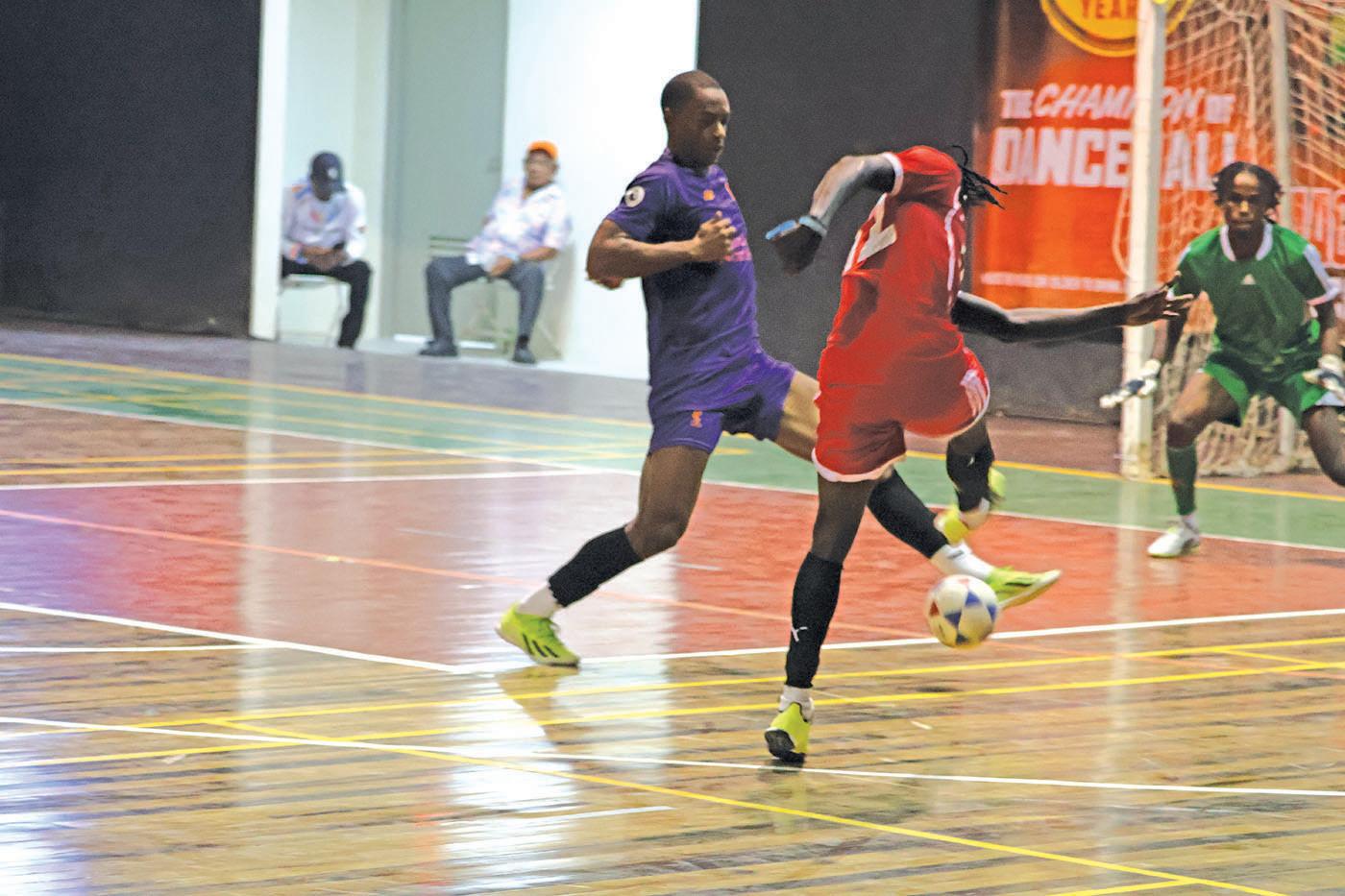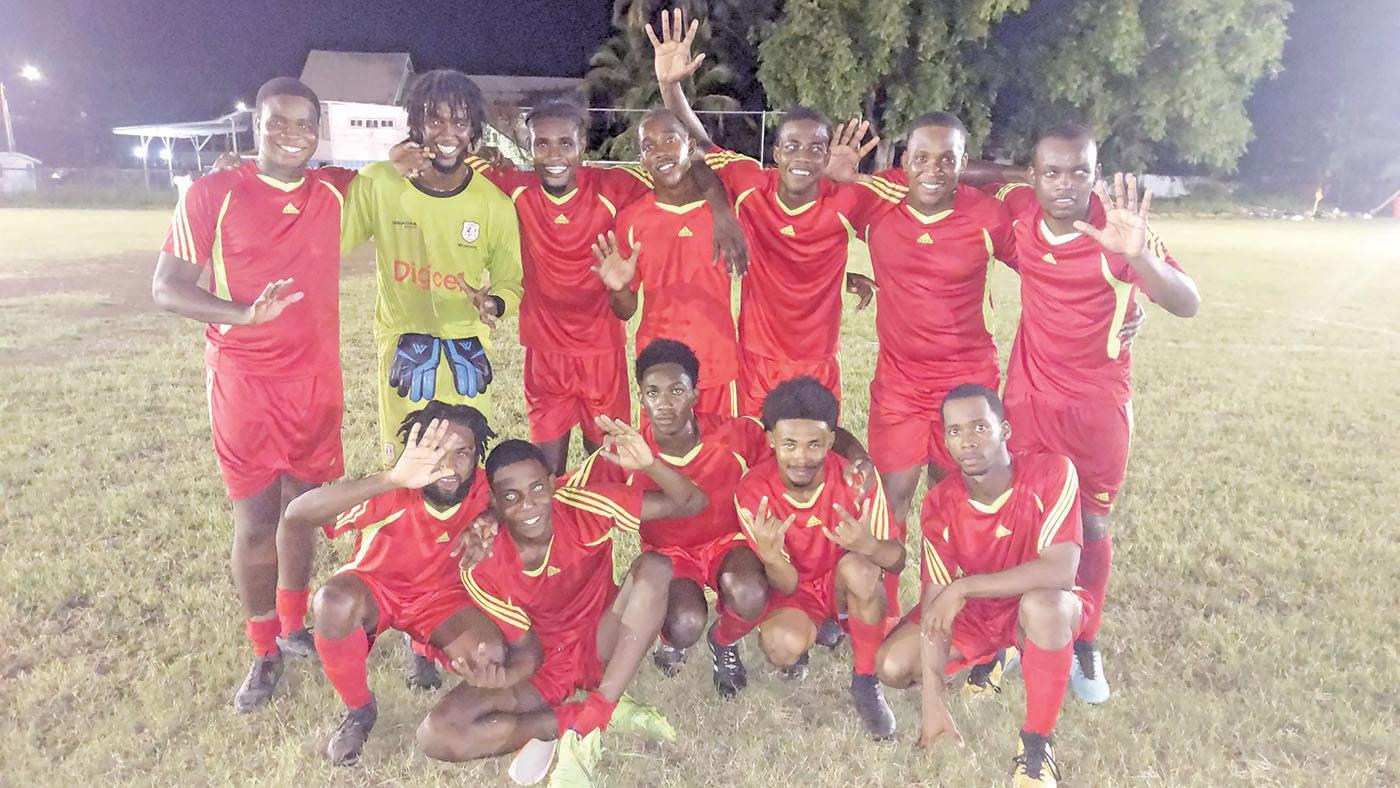




New Year’s Day babies

“It’s a great time to be born a Guyanese” – PM’s wife tells mothers GPHC finalising accommodation for 300 Cuban nurses amid major shortage – CEO Cop files $80M lawsuit against Rickford Burke
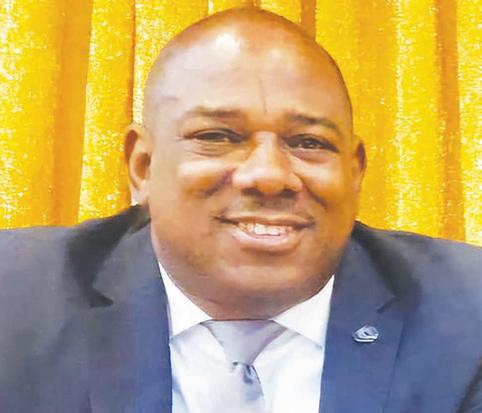
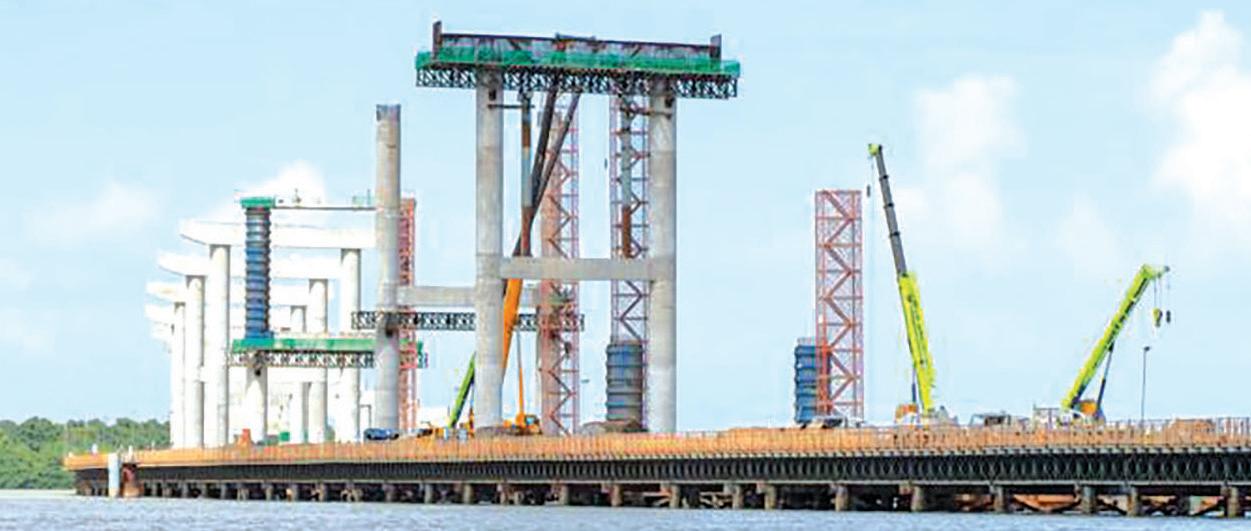



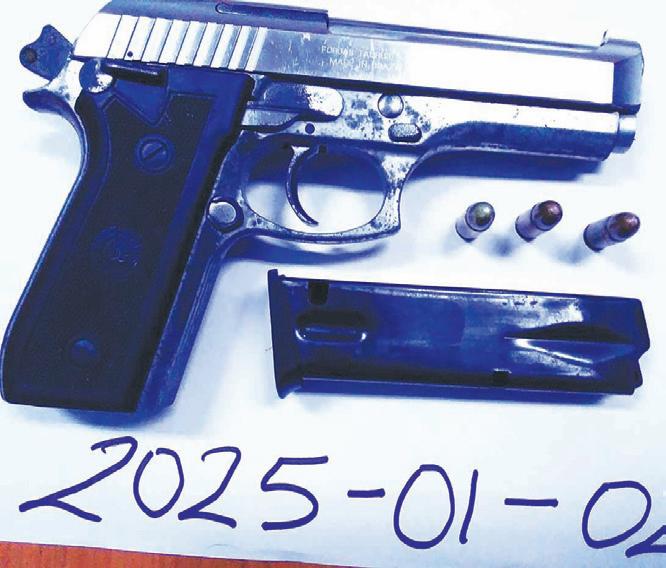
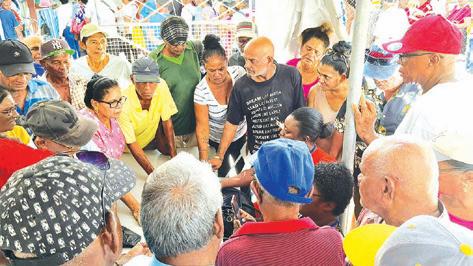
Miner stabbed to death during altercation; suspect claims self-defence Govt records 17% increase in pensioners for 2024 Regional gang violence Guyana assessing regional security risks, beefing up local protection – Pres Ali
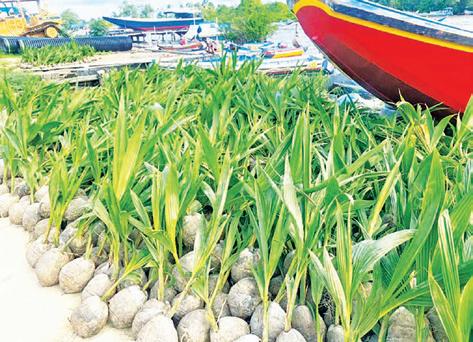

Acane harvester was shot and killed after he reportedly refused to leave a Lesbeholden, Black Bush Polder (BBP), Corentyne, Berbice grocery/ liquor store on New Year’s Day.
The dead man has been identified as 29-year-old Yognand Chetram also called “Boie”, of Alness Village, Corentyne, Berbice, Region Six (East BerbiceCorentyne)
Based on reports received, the now-dead man and his brother had gone into the T Ramnarine Store, but were later asked by the owner to leave the premises which they refused to do. Police said that the 65-yearold proprietor, who is a licensed firearm holder, was subsequently taken into custody.
Chetram’s widow, Roshnie Baichan explained that her husband and other family members left home about 04:30h for BBP to spread fertiliser in a rice field after which they went into the shop to change some money into smaller notes so
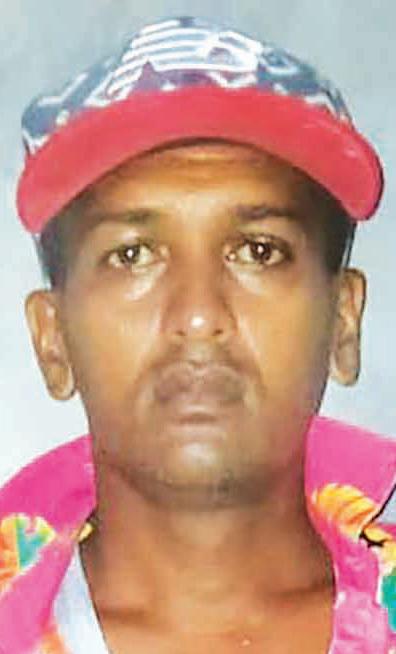
it could have been divided equally.
The woman stated that her husband would normally go to the said shop after getting paid to ‘break up’ the money so that it could be divided equally among the workers.
She said about an hour after her father-in-law returned home she did not hear from her husband and decided to contact him via phone. She was reported-
ly told that he was still in BBP and was on his way to change the money.
Again, after some time had elapsed and he did not return home, she went in search of him. “When I reach the shop, he said he was going, I see him lie down on the road dead. I try turning him over for him to wake up and when “Antie” come she say ‘no pulse’, that he dead.”
According to the mother of three, there was no one at the scene when she arrived and the gates to the shop were closed.
However, the Police stated that the businessman related that there was an argument among persons in the beer garden and the now-dead man and others were breaking bottles and threatening each other.
The businessman told detectives that he attempted to close his gate and Chetram and another man threw him to the ground, causing injuries to his elbow. He added that while on the ground and being threatened with bottles, he whipped out his firearm and discharged two
rounds hitting Chetram, who later collapsed.
He then secured his premises and reported the incident to the Police. At the scene, Police found two .32 spent shells – one inside the shop and one outside near the gate.
Meanwhile, the dead man’s brother, Devendra who was with him at the time of the shooting incident recalled that three shots were fired from inside the shop.
“When awe go in the shop, they get a couple well more Black Bush people in the shop we call pon “Uncle” and he tell awe come out the shop,” he said, while stating that his brother did not get the money changed.
Devendra recalled encouraging his brother to leave the shop as he went out to get a taxi to take them home.
“Me buddy know one and two body who went in the shop and he start talk with dem and me walk come out the shop,” he added.
According to Devendra, while he was outside, he

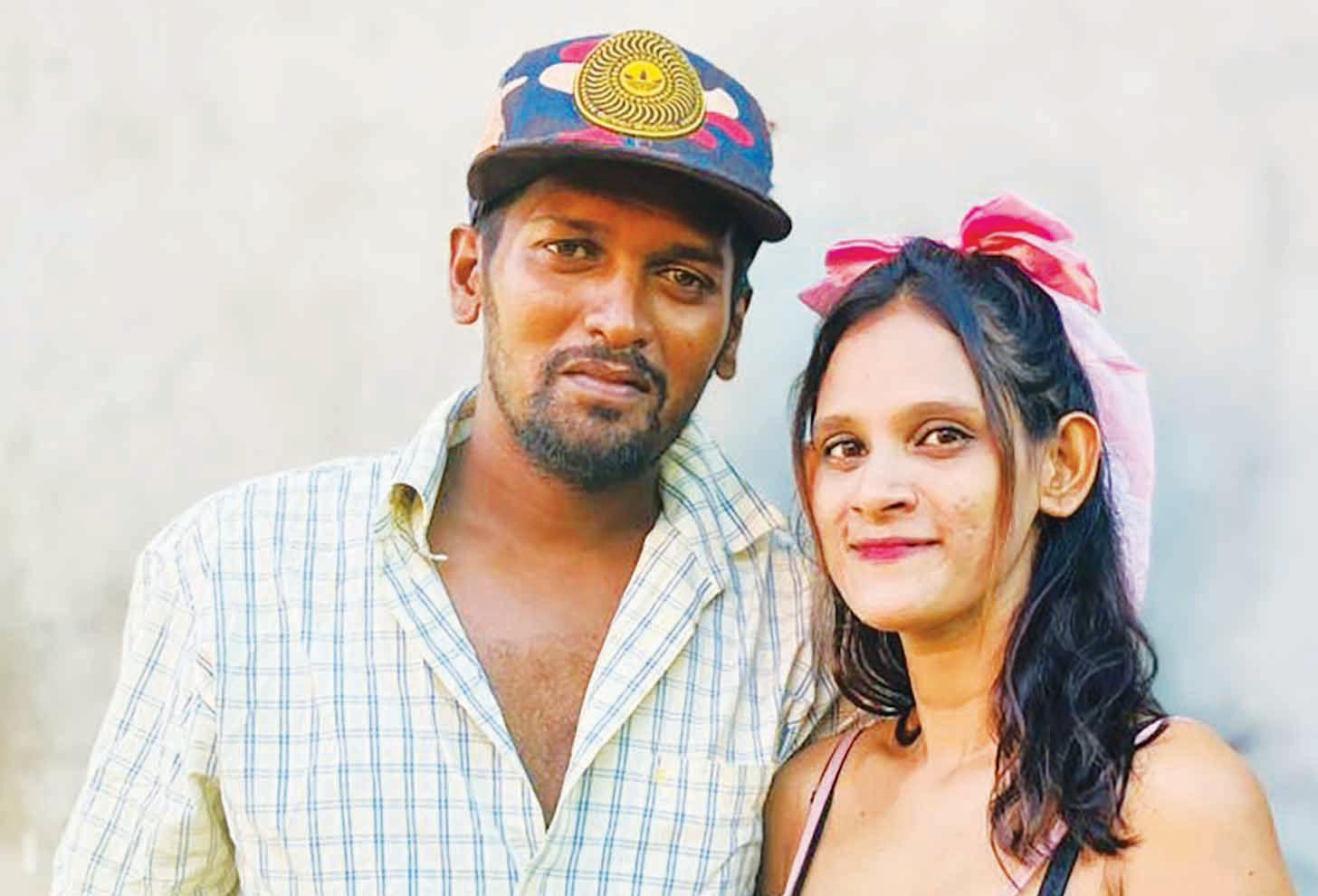
heard a gunshot and shortly after he saw his brother running out of the shop with the owner running behind with the gun in his hands.
The owner then discharged a third round, he stated.
He said that the businessman pointed the gun in
his direction, but out of fear for his life, he walked away leaving his brother on the ground.
An autopsy conducted on Chetram gave the cause of death as shock and haemorrhage due to a gunshot injury.
(Andrew Carmichael)
In response to a critical nursing shortage, the Georgetown Public Hospital Corporation (GPHC) is in the final stages of preparing accommodations for 300 Cuban nurses who are set to join the healthcare workforce in Guyana.
Preparations for the 300 Cuban nurses' arrival include ensuring that the necessary accommodations are in place to support their stay.
GPHC Chief Executive Officer (CEO) Robbie Rambarran last week said that the hospital was working closely with local authorities to ensure a smooth integration process for the Cuban nurses, including orientation programmes and cultural exchanges.
The arrival of the Cuban nurses marks a step towards addressing the immediate staffing crisis at GPHC.
According to Rambarran, the initiative will also strengthen the country’s health sector, which has been under immense strain due to an ongoing shortage of qualified nursing staff.
“There’s another strategy of bringing nurses from Cuba to Cuban Brigade. There are nurses that are already here. There are about 300 nurses more that will be coming soon while we are finalising their housing, their accommodations,” the CEO said.
There are currently 33 Cuban nurses employed at the public hospital.
GPHC’s nursing staff deficit currently stands at 700 nurses, and the move follows a bilateral agreement between Guyana and Cuba aimed at addressing the challenges within Guyana’s healthcare system.
Commenting on the current situation at GPHC, Rambarran noted that while a shift should have about six nurses, often times there are just about three because some are not on time, leaving doctors to fill in and complete some of the duties of nurses.

The CEO explained that the hospital has been utilising certain strategies such as training, with about 1000 registered nurses in training.
“I don't think it's a mass migration like before. From the last we checked, many of the nurses who have exited the institution did not migrate. But they work at other hospitals and there are other companies that have their inhouse medical care.”
“So, it's not that people are, the nurses are migrating like before. But one of the strategies is training, which we have the hybrid training programme and there is about a thousand RNs that is currently in training. And then there are the nursing assistant programme that is in training. This building that we are in is actually, the reason for this building that we are renting is for training. It's particularly training of nurses,” he added.
Despite these challenges, nursing administrators at the GPHC are committed to addressing the workforce issues by focusing on professional development, in-service education, and clinical training.
Addressing the nursing shortage at the GPHC is not only a matter of improving working conditions for healthcare professionals but also ensuring that the hospital can continue to meet the healthcare needs of the population.
(G1)


The Demerara Harbour Bridge will be closed to vehicular traffic on:
Friday, January 3 – 03:45h-05:15h and Saturday, January 4 – 20:30h-22:00h.
The Berbice Bridge will be closed to vehicular traffic on:
Friday, January 3 – 06:35h-08:05h and Saturday, January 4 – 07:15h-08:45h.

Parika and Supenaam departure times – 05:00h, 10:00h-12:00h, 16:00h, 18:30h daily.





Thundery showers are expected during the day and the night. Temperatures are expected to range between 23 degrees Celsius and 29 degrees Celsius.
Winds: East North-Easterly to Easterly between 2.23 metres and 4.02 metres.
High Tide: 06:51h and 19:06h reaching maximum heights of 2.53 metres and 2.65 metres.
Low Tide: 12:38h reaching a minimum height of 0.69 metre.










Though delayed, new Demerara River bridge will be delivered this year – Govt …extension to facilitate curing of concrete works
The completion of the new US$260 million four-lane bridge across the Demerara River, which was shifted from a 2024 year-end deadline to March 2025, has now been further extended by another five months in order to allow for the concrete works to be properly cured.
This was the outcome of a meeting between a President Dr Irfaan Ali-led Government team and the contractor, a consortium led by China Railway and Construction Corporation Limited (CRCCL), on Thursday afternoon. Public
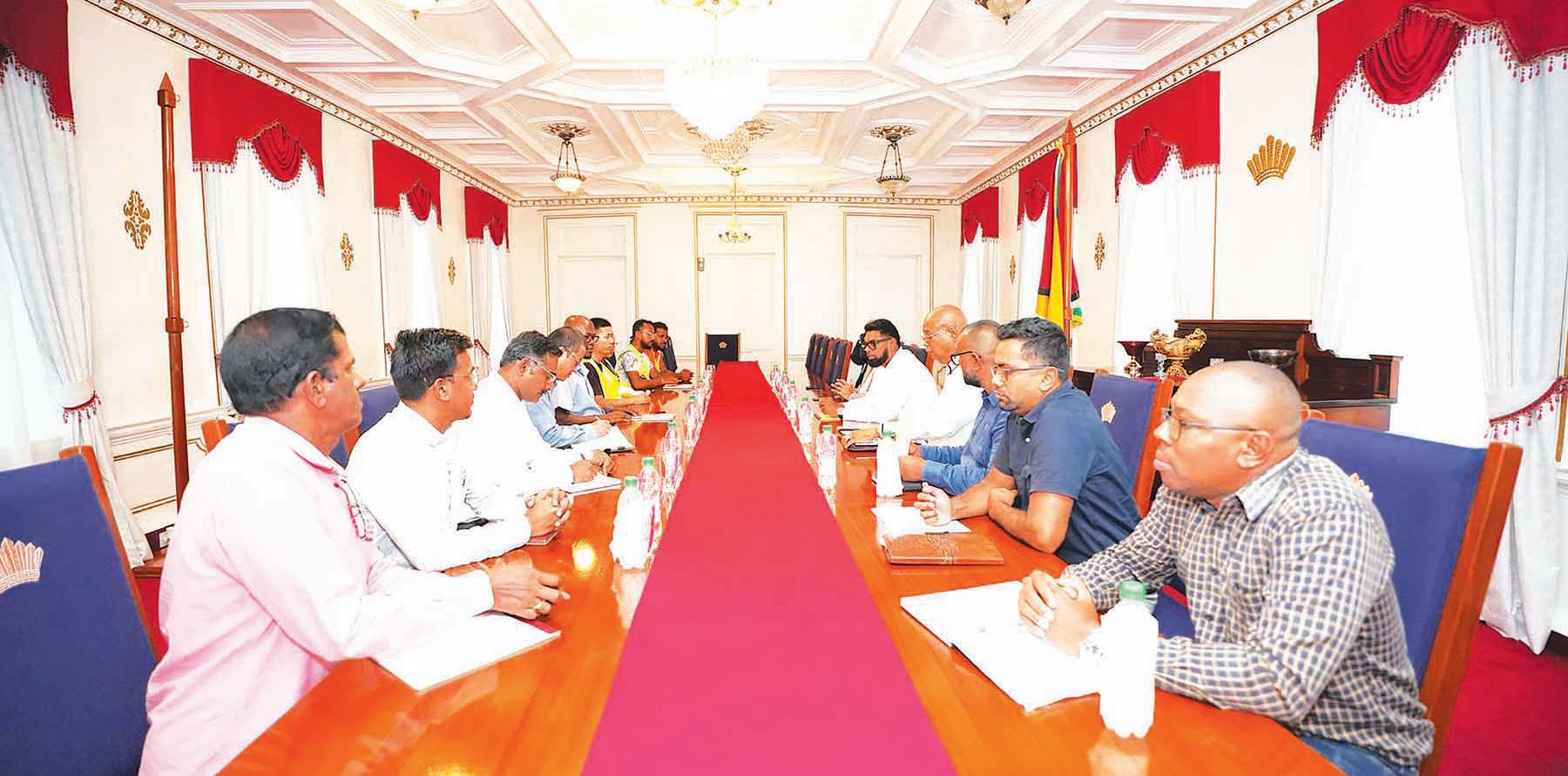

Works Minister Juan Edghill and Housing and Water Ministers Collin Croal and Susan Rodrigues, along with their technical teams, were part of the discussions.
During the engagement, the Head of State was updated on the progress of the construction of the new bridge and the access road leading to the bridge.
In an invited comment after the meeting, Edghill explained that the deadline extension was given after examining the realities of the works and the project deliverables. Government had previously granted the extension to March 2025 after there was a late delivery of some of the project sites to the contractor.
“We have some construction that needs to be done that you just can’t shorten the time, because you have to have curing time for concrete and all the rest of it,” Edghill told reporters on Thursday afternoon.
According to the Public Works Minister, after going through everything, “…the project team and the consultants and the contractor, we’ve agreed on a time schedule [of] nothing beyond August 31.”
Already, President Ali, in his New Year address to the nation, had committed to the new Demerara River Bridge being operational by the end of 2025.
No cost increase
Vice President Bharrat Jagdeo, during his weekly press conference on Thursday, assured that the project cost has not increased.
“There is no cost overrun now on the bridge, so that’s good for [the government]…
So, for me, a few months’ delay is not fatal,” Jagdeo contended.
The Vice President went on to highlight that the enormous benefits to be accrued from the bridge outweigh any negativity being peddled relating to its delay.
“It’s being built… [And]
by building that concrete four-lane bridge and allowing free movement without tolls, we’ve suddenly created the conditions for the industrialisation of Region Three, because already we’ve run out of room for the industrialisation in Region Four,” VP Jagdeo pointed out.
Back in September, Minister Edghill had reported that the Demerara River Bridge project was some 67.8 per cent completed. While the bridge is being constructed by the CRCCL International-led joint venture construction, Italian firm Politecnica is providing supervisory services on the project.
The new bridge would land aback Nandy Park, East Bank Demerara (EBD), and at La Grange, West Bank Demerara (WBD). A massive 650-person workforce is working to advance the project. Of these, 120 are Guyanese while 85 are Venezuelan migrants.



Editor: Tusika Martin
News Hotline: 231-8063Editorial: 231-0544, 223-7230, 223-7231, 225-7761
Marketing: 231-8064Accounts: 225-6707
Mailing address: Queens Atlantic Industrial Estate Industrial Site, Ruimveldt, Georgetown
Email: news@guyanatimesgy.com, marketing@guyanatimesgy.com
As the new year is ushered in, President Dr Irfaan Ali’s New Year’s message resonates with a commitment to a safer Guyana, underscoring the administration’s focus on enhancing security, reducing road fatalities, and utilizing technology to drive progress. This vision, encapsulated in the President’s pledge to accelerate the rollout of the Smart Country Programme and launch the Safer Roadways Initiative, is a forward-thinking approach that prioritizes the well-being of citizens and the safeguarding of property.
Safety has always been the foundation of any thriving society. Without it, economic progress, social harmony, and individual peace of mind remain elusive. President Ali’s emphasis on fostering safer communities is timely, as challenges such as road fatalities and criminal activities persist, demanding urgent and innovative interventions. The Government’s articulated strategy of leveraging technology and intelligence-driven solutions could well be the transformative force that shifts the paradigm in public safety.
The Smart Country Programme, already gaining momentum, is a key pillar in this endeavour. By integrating smarter technology into policing framework, Guyana is poised to adopt systems that are proactive, rather than reactive. Real-time surveillance, data-driven crime prediction, and enhanced coordination among law enforcement agencies can drastically improve response times and deter criminal activities. This aligns with global trends wherein smart policing models have proven to be game-changers in reducing crime rates. The rollout’s acceleration in 2025 signals the Government’s recognition that technology is not merely an accessory, but is a necessity in the fight against crime.
Equally critical is the Safer Roadways Initiative, which directly addresses a pressing national concern: the high incidence of road accidents and fatalities. With statistics consistently highlighting the toll of reckless driving, poorly designed roadways, and inadequate enforcement of traffic laws, a multifaceted approach is imperative. The President’s plan to redesign highways and roadways signals a commitment to infrastructure that prioritizes safety. Features such as better signage, pedestrian walkways, and proper lighting can significantly reduce hazards.
However, infrastructure alone cannot resolve the issue. Strengthened enforcement of road safety laws is essential. Traffic regulations must be more than words on paper; they must be robustly implemented. This requires both an increase in traffic personnel and the use of technology such as speed cameras, breathalyzers, and automated traffic monitoring systems to ensure compliance. Moreover, public education campaigns aimed at promoting responsible driving behaviour would be essential in changing the cultural attitudes that often contribute to reckless driving.
The integration of technology -based solutions -- such as traffic management systems, digital ticketing, and mobile applications for reporting road hazards — could revolutionize how road safety is approached. These tools not only streamline enforcement, but also empower citizens to participate in creating safer roadways. It is commendable that the Government recognizes the potential of technology in this regard and is actively investing in its deployment.
While the President’s vision is bold, its success hinges on effective implementation and collaboration. Local municipalities, private sector stakeholders, and civil society organizations must all play their part. Community engagement would be vital in fostering trust and cooperation, particularly in areas where relationships with law enforcement may be strained. Additionally, the allocation of adequate resources — both financial and human — would determine how swiftly and effectively these initiatives could be realized.
Citizens must also embrace their role in this collective journey. Whether by adhering to traffic laws, supporting community policing efforts, or advocating for accountability in the use of public resources, each person has a part to play.

has indelible place in our history – he deserves highest national
By Dr LesLie ramsammy
After visiting the Kaieteur Falls, he said, “I have visited the seven wonders of the world, but the Kaieteur Falls is truly the world’s 8th wonder”. But he also stated in his autobiography that, during his mission to observe Guyana’s election in 1992, he had never felt more in danger anywhere else in the world. Yet, Jimmy Carter, now known as the best former president ever anywhere in the world, played a pivotal role in changing Guyana from those dreadful times.
The journey we began in 1992 with Jimmy Carter has led to Guyana being the most exciting possibility for a country of progress and prosperity. Jimmy Carter has an indelible place in the pages of Guyana’s history. He will always be a hero in the eyes of most Guyanese. For obvious reasons, some would not embrace this notion; but, even among those, there are people who grudgingly acknowledge that Jimmy Carter played an indispensable role in placing Guyana on the road to freedom and democracy, modernization, progress and prosperity.
The Guyanese people mourn - along with our American sisters and brothers, and with countless millions around the world - the passing of an iconic figure in our history. President Jimmy Carter swooped into Guyana on October 12, 1990, and, barely 24 hours later, breezed out after having secured a deal with the then Guyanese President Desmond Hoyte for electoral reforms; something many others had tried and failed to accomplish.
The local Opposition parties, at the time led by Cheddi Jagan, had tried for more than two decades to obtain those same reforms. CARICOM leaders, even if half-heartedly, had tried for over two decades and failed. The Commonwealth and
other leaders had tried, but the PNC-led dictatorship -- first under the leadership of Forbes Burnham, and then under the leadership of Desmond Hoyte -would not bend.
Just before President Carter landed in Guyana, President Desmond Hoyte declared, on October 10th, 1990, that Guyana was a sovereign state, it has no obligation to listen to Jimmy Carter; counting of votes at the polling station was never going to be permitted, and that Guyana was not interested in any foreigner dictating to it, famously insinuating that Jimmy Carter should mind his own business. Within 24 hours, despite Hoyte’s bravado and intemperance, he wilted and meekly bent under the pressure, some would say “magic”, brought by the presence of Jimmy Carter.
In reality, even before President Carter had left the USA to come to Guyana, the deed was done. First, President Carter had informed Dr. Cheddi Jagan that one of the conditions for agreeing to intervene in Guyana was that all political parties, including the Guyana Government, must agree and issue an invitation to the Carter Center.
I was nervously preparing for an important Journal Club presentation at the State University of New York in Stony Brook, where I was a professor of medicine, on the morning of September 27, when the State Department in Washington announced that the Guyana Government had invited the Carter Center. We all knew there and then that the US Government had had enough, had issued an ultimatum, and that Desmond Hoyte had buckled. I knew there and then that the “writing was on the wall”.
But we knew for sure that the deed was done when Jimmy Carter arrived at the then
Timehri International Airport in Guyana. The media - dozens of them: from Guyana and the wider Caribbean and America -- were in a frenzy. They had expected to engage President Carter, who also had announced a press briefing at the airport. The press briefing was one of the shortest-ever press briefings in history. It lasted just a few seconds. President Carter took the microphone without being introduced by anyone; made a short, single-sentence declaration, and simply left without taking a single question. He declared that he was visiting Guyana to see if the possibility existed for a free and fair election; and if in his mind the possibility was slim, he would not be coming to observe the elections.
It was at that point that he changed the dispensation. it was no longer the Opposition trying to gain reforms and to have Jimmy Carter come to Guyana; it was now up to Desmond Hoyte to get President Carter to come. Desmond Hoyte and the PNC had no choice, because if they allowed him to leave with the pronouncement, he was not coming back; he would have declared unequivocally that there was not even a slim chance that the PNC under Desmond Hoyte was prepared to permit a free and fair election. Desmond Hoyte and the PNC played a game of poker with Jimmy Carter and lost.
In a brief personal discourse with President Jimmy Carter at breakfast on October 13, 1990, I asked him if this was the strategy all along. He looked at me, smiled, said nothing, and shifted the conversation to the famous Stabroek Market.
I was part of the Opposition’s team that prepared our requests for electoral reform that was discussed with President Jimmy Carter on the morning of October 13,1990. With him was his wife Rosalynn Carter, and Robert
Pastor. Cheddi was joined by Gail Teixeira. I sat next to Gail, opposite Mrs. Rosalynn Carter. President Carter discussed with us, but did not promise anything, other than that he was going to discuss our proposal for electoral reform with Desmond Hoyte. That afternoon, while Jimmy Carter was holding talks with Desmond Hoyte and his team, we held a unity rally at the Parade Ground. If memory serves me well, Dr. Rupert Roopnaraine chaired the rally. Several well-known figures spoke, including Clive Thomas, Paul Tennessee and Nanda Gopaul. The last few speakers in order were Leslie Ramsammy, Ashton Chase, Cheddi Jagan and Bishop George. Just before I spoke, we received word that Desmond Hoyte’s obstinance had collapsed, and he had agreed to the complete list of reforms President Carter had pressed him on. Although the subsequent journey to the first freeand-fair election in post-independence Guyana was in place from October 13, 1990, the journey to that election, which was eventually held on October 5, 1992, was another epic struggle. From October 12, 1990 until the completion of the election in October 1992, President Carter and the Carter Center remained intimately engaged with the election process. It is my humble view that without the gigantic presence of Jimmy Carter, Guyana’s first free-and-fair election would not have happened then. This is in no way meant to diminish the Herculean struggle led by Cheddi Jagan and the roles played by many individuals and groups. All were critical elements in the epic struggle for free-and-fair elections in Guyana at the time; but, without the presence of Jimmy Carter and the Carter Center, October 5, 1992 would not have been possible.
Dear Editor, Afloat daily on the surface of the country’s political arena, putrid racist views spew forth from distorted consciences that brazenly manufacture and regurgitate frivolous claims to discredit the Government, President Ali, or Vice President Jagdeo.
Intent on instilling doubts in the minds of citizens, the racist verbiage - often designed to foster indifference and distrust – is regularly focused on heightening anxieties and divisiveness among the ethnically-distinctive sectors of the population.
A content analysis of remarks made by Terrence Campbell about Vice President Jagdeo would help in shedding some light on ever-present underpinnings of racist messaging. Campbell asserts that the “VP has a genetic predisposition to eating his cake and having it.” This phrase, laced with the venom of racism, also inheres an insurmountable degree of evasiveness, or obliviousness
Let’s examine the “hows/ whys” starting with the phrase “genetic predisposition.”
To state that the Vice President “has a genetic predisposition (to eating his cake and having it)” is to claim that he has inherited from his parents certain biological traits which predispose him to want things “both ways.” Customarily, an intelligent person of colour – whether Afro, Indo, Mixed, or Native Guyanese - would refrain from making such ludicrous racist claims, much less brazenly assert that someone is “genetically predisposed” to hereditary behavioural patterns. Why, may one ask?
Ever since William Bateson coined the term “genetic” (1905) in reference to the study of genes in plants and animals, Anglos (whites) began to utilize the conceptual explanation of genetics to dehumanize, discredit, subjugate, oppress and exploit people of colour - which include Africans, Indians, Chinese, Portuguese, Mixed, Native etc. This they did because the genetic explanation provided them with a convenient ploy to shift from a cultural to a biological delineation of white superiority and domination over non-white humans. Prior to the use of genetics, Anglos, in efforts to maintain dominance over non-whites, classified such groups of people as primitive, uncivilized, savage, barbaric, heathen, chattel, throwbacks etc., as if to authenticate that they are “sub-human”.
Given these facts, why did Terrence Campbell claim “The VP has a genetic predisposition”? Could it be because he believes he is excluded from the racist schema of “genetic predisposition”?
Now, let’s focus analysis on the second half of Campbell’s statement, (the VP) “eating his cake and having it.” Literally, the phrase means “one can’t have two incompatible things at the same time”, or “one cannot have it both ways”, or further still, “one cannot hold two mutually exclusive views as valid at the same time”. How can someone then be accused of being “genetically predisposed to eating his cake and having it,” if it is not meant to discredit the person, or accuse him/her of being dishonest or untrustworthy; i.e., having things both ways?
It could be that Terrence Campbell’s statement is
subconsciously an indication of “psychological projection” which Encyclopedia Britannica defines as “the mental process by which people attribute to others what is in their own minds”. This concept of “psychological projection” then prompts one to ask, ‘Who truly is “genetically predisposed” to dishonestyhaving things both ways - the accuser (Campbell) or the accused (VP Jagdeo)? You be the judge.
Mindful of the above, Guyanese of all races/ ethnicities should not find it difficult to apprehend Terrence Campbell’s statement about Vice President Jagdeo as uninformed and disgraceful. For Campbell to claim that “The VP has a genetic predisposition” is to deny Anglos’s utilization of the same labelling to degrade all people of colour, of which Campbell IS A PART.
Assuming one agrees that Jagdeo is genetically predisposed to his Indian ancestry, why exclude him from having such traits as Devout Religiosity, Mathematically and Scientifically-minded, since such are regularly associated with individuals of Indian heritage? Farfetched? Think again. Many scientists from yesteryear and today have, and are combing through and scrutinizing the Upanishads, Gita and Puranas – Srutis and Smritis - for explanations to cosmic energy, consciousness and creation, preservation, and destruction of the universe itself.
Acknowledging Jagdeo’s genetic Indian ancestral grounding, does this then predispose him to being erudite and inspired?
Terrence Campbell may find this baffling, if not irrita-
ble by such an assertion, while the Vice President would acknowledge such genetic attribution of brilliance to be disquieting.
As the new year progresses and election day draws nearer, opposition leaders, with their orchestras of bellicose acolytes, would continue to belt out racist lyrics as they compete to perform on the open platform of public opinion. Some band members – like Lincoln Lewis, who rendered tunes of aggressive resistance (12/31/24) – would likely continue to spew such threats. While he bravely quoted Martin Luther King, Lewis failed to acknowledge that King believed in, and practised, “Passive (non-violent) Resistance.” Hence, what Guyanese truly need resist is the incendiary propagandizing racist chatter of indifference, divisiveness and distrust such as that of Lewis.
In general, the peoples of Guyana need to resist oppositions’ rancorous renditions of strife and instability – indicators of the desperate search to stymie the PPP/C inroads into a united Guyanese society. Opposition leaders view such emerging unity as a hindrance to their ascension to political power. Henceforth, Guyanese need to be prepared that the power-starved destabilizers of a democratic, developing and societally harmonious Guyana would revise and refashion renditions of their political lyrics with the hope that many would dance to their worn-out propagandistic tunes of racism and aggression.
Regards, Narayan Persaud, PhD Professor Emeritus
In the March 2, 2020 elections, the Carter Center conducted its 5th election observation mission in Guyana. President Carter personally led election observation missions in Guyana in 1992, 2006 and 2015, from what I remember. His leadership of the 2015 mission was cut short by illness. Incidentally, the 2006 mission was the 100th election observation mission around the world for the Carter Center.
Few of us would have guessed that the political party and the people who were responsible for all post-independence elections in Guyana up until 1992 being rigged would emerge again to attempt rigged elections in 2020, and that the Carter Center would again play a pivotal role in eventually preventing the riggers from ending Guyana’s fledgling democracy.
In 2020, between March 2 and August 2, the PNC tried desperately to steal the elections. After resistance and legal battles, the PNC-led government was forced to accept a recount. For the recount, they banned the re-entry into the country of international observers, including the Carter Center. A former CARICOM Prime Minster described the attempted thievery as the most “transparent” effort ever to steal an election.
Jimmy Carter and the Carter Center remained engaged with Guyana since those early years. Outside of at least three election observations that he personally led, he visited on another occasion, including in 2004. Soon after the elections of 1992, the Carter Center worked with the Cheddi Jaganled PPP Administration to develop Guyana’s first National Development Strategy. Cheddi had selected the young Finance Minister Bharrat Jagdeo to lead the Guyanese team in developing the NDS. Later, as President, Bharrat Jagdeo launched the NDS. While he earned his place as a major personality in Guyana’s history, Guyanese also remember President Carter for his high moral and social justice values. For Guyanese and most Americans, Jimmy Carter would forever be remembered as America’s best-ever former President. As Guyana intensifies its renewable energy strategy, we remember that Jimmy Carter was the first American president to place focus on renewable energy, and had placed solar panels on the roof of the White House.
Today Guyana’s LCDS is a global model for reducing carbon emissions, and the Carter Center consistently promotes Guyana’s LCDS economic mod-
el.
President Carter was the first American president to hire significant numbers of women and African-Americans in the US Government at high levels. For instance, Andrew Young, a civil rights leader, became the first-ever African -American to be the US’ UN Representative. Today, Guyana itself ranks high in the participation of women in Parliament and in Government.
As President, Carter changed America’s foreign policy. His foreign policy was based on peace and fairness. Jimmy Carter’s greatest foreign policy achievement was his negotiation of the Camp David Accords, which have not been violated in more than 40 years, and have finally brought peace between Egypt and Israel. Even as the incoming American president has revived talk of retaking the Panama Canal, we must remember that it was President Carter who had handed over the Panama Canal to the Panamanians, improving relationships with Latin American governments.
Although normalisation with China was initiated by President Richard Nixon, it was Jimmy Carter who formalised the normal relationship with China. It was also Jimmy Carter who negotiated the SALT-II disarmament trea-
ty with the Soviets, although it was not ratified by the Senate. Still, it made the world a safer place.
Among Carter’s humanitarian work around the world is his leadership of Habitat for Humanity. Thousands of homes for the poor were built under the Carter Center’s role in Habitat for Humanity, with President Carter personally contributing financially and physically. President Carter worked with several African countries to increase agricultural production with genetically selected seeds, fertilizer, and special planting techniques. In 1985, he launched a campaign to eradicate a parasitic disease, guinea worm, that afflicted millions across Africa and parts of Asia. As a result, last year, there were fewer than 20 cases. He also worked to reduce other devastating diseases, including river blindness and trachoma. We must not underestimate the impact of the Carter Center on the global fight to improve mental health, especially among adolescents.
He was an American, given birth in America, but he was truly a global citizen of great worth. A great man has passed, and Guyana mourns his passing as if he were one of us. President Carter deserves Guyana’s highest national honour.
Dear Editor,
As Guyana stands on the brink of transformation, the year 2025 presents a significant opportunity to address the pressing needs of all citizens on a personal level.
With our country’s enormously rich natural resources, diverse cultural landscape, different peoples, and immense potential, there is a compelling case for ensuring that every Guyanese can enjoy a good and comfortable life, irrespective of their geographic location, social status, religious belief, or political affiliation.
Our country is endowed with substantial natural wealth, including vast reserves of oil and gas, fertile agricultural lands, and rich biodiversity. However, the reality of our challenge lies not in the abundance of resources, but in the equitable distribution of wealth among the population.
As the country continues to develop its infrastructure, particularly in healthcare, education, agriculture, roadways, and power generation, it is crucial to ensure these advancements translate into tangible benefits for all citizens on a personal level. Our goal as a country should be to create a society wherein every individual can thrive and experience a good life. Most would agree that a livable income is central to improving the quality of life for our fellow Guyanese. Currently, many working-class citizens and hardworking public servants struggle to meet their basic needs, illustrating a disconnect between national wealth and individual prosperity. For instance, the fact that a family of four must save significantly to dine at a decent restaurant highlights the economic strain many face daily.
Government needs to prioritize policies that elevate wages and create job opportunities that reflect the country’s wealth. A livable income is not just a financial necessity; it is a fundamental aspect of human dignity and wellbeing. We welcome and accept cash to give back to the people, but there is more honour and dignity in one
earning fairly for one’s labour. As Government prepares to unveil its 2025 budget, it must consider the overarching question that resonates with the average Guyanese: “What is in it for me?”. While infrastructural improvements are vital, citizens are equally concerned about their immediate needs and aspirations. Government should focus equally on creating economic policies that foster stability and growth, ensuring that all citizens could access quality education, healthcare and justice; and on fostering an environment that is conducive to entrepreneurship and innovation, in order to empower individuals to pursue economic freedom, thus enhancing their quality of life.
Further, in order to achieve this vision of inclusive development, Government must implement policies that are reflective of the diverse needs of its population. Those include investing in community-based initiatives that address local issues, and engaging citizens in the decision-making process. By prioritizing social equity and ensuring that marginalized groups have access to opportunities, the Government can foster a more cohesive society.
Finally, in 2025, Government and society as a whole must prioritize the personal and economic needs of every citizen. By focusing on creating a livable income, fostering economic freedom, and implementing inclusive policies, our country can transform its wealth into a reality that benefits all.
The vision for a comfortable life, a good life for every Guyanese, is not just a lofty aspiration, but a tangible goal that can be achieved through collective effort and commitment to equity. Ultimately, the true measure of a nation’s progress lies in the wellbeing of its people; and in 2025, Guyana would have the opportunity to realize this vision.
Yours respectfully, Jermaine Figueira, Honourable Member of Parliament



Two polygons are congruent if their shapes and sizes are the same. The sides and the angles in one polygon must exactly match the sides and the angles in the other. Congruent polygons do not have to face in the same direction. The best way to find out if two polygons are congruent is to measure the sides and the angles in both.
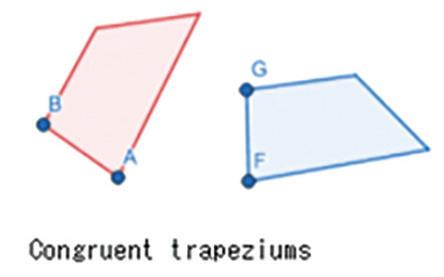
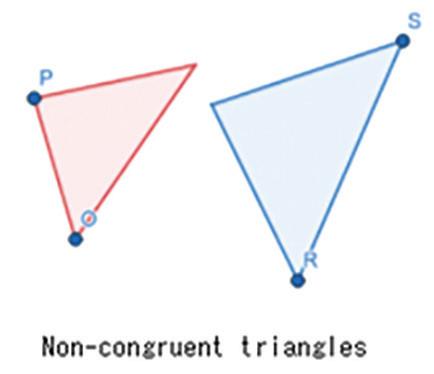

Exercises: Identify the congruent polygons

Learn how to achieve your goals – which sets you up for lifelong success.
A New Year’s resolution to do better in school, read more books or clean your room sound great – until it’s completely forgotten in a few weeks.
We can harnests the tradition of New Year’s resolutions to learn how to set and meet goals.
How to set good goals
To set yourself up for success, make your resolutions SMART. That means each goal should be…
– Specific (eg, playing football instead of watching TV after school)
– Measurable (a numerical
goal, like two times a week)
– Attainable (nothing too ambitious)
– Relevant (aligned with your family’s values)
– Time-bound (with a set start and end date)
Before launching your resolution, brainstorm potential pitfalls and coming up with solutions. For instance, if your resolution is to go on a daily bike ride, but you know that past adventures have been derailed by missing helmets or flat tyres, plan to get everything ready the night before.
“Just introducing kids to this idea – thinking about where we want to go and keeping our attention on what we want –is pretty useful,” says William

R Stixrud, a neuropsychologist and co-author of The SelfDriven Child
While many adults make New Year’s resolutions every year, child and family resolutions are less common.
Setting and keeping a New Year’s resolution builds what psychologists call executive function. This ability is linked to a lifetime of positive outcomes, including preschool readiness, academic achievement, career success, and overall life satisfaction.
But because children’s brains are still developing, complex activities like goalsetting can be challenging.
That’s why experts say parents need to provide appropriate support to help
children achieve their goals –and not get frustrated when things don’t go as planned. Here’s how to get started…
The science behind setting and keeping goals
Keeping a New Year’s resolution is hard for adults – and even harder for kids, Zelazo says. That’s because it requires complex links between the prefrontal cortex, which handles goal-setting and progress-tracking, and other brain areas, such as the amygdala, where our gutlevel emotions reside. These connections don’t fully mature until well into adulthood.
(Adapted from natgeokids. com) TO BE CONTINUED


by Eliza Cook
Old Time has turned another page Of eternity and truth; He reads with a warning voice to age, And whispers a lesson to youth. A year has fled o’er heart and head Since last the yule log burnt; And we have a task to closely ask, What the bosom and brain have learnt? Oh! let us hope that our sands have run With wisdom’s precious grains; Oh! may we find that our hands have done Some work of glorious pains. Then a welcome and cheer to the merry new year, While the holly gleams above us; With a pardon for the foes who hate, And a prayer for those who love us.
We may have seen some loved ones pass
To the land of hallow’d rest; We may miss the glow of an honest brow And the warmth of a friendly breast: But if we nursed them while on earth, With hearts all true and kind, Will their spirits blame the sinless mirth Of those true hearts left behind?
No, no! it were not well or wise
To mourn with endless pain; There’s a better world beyond the skies, Where the good shall meet again. Then a welcome and cheer to the merry new year, While the holly gleams above us; With a pardon for the foes who hate, And a prayer for those who love us.
Have our days rolled on serenely free From sorrow’s dim alloy?
Do we still possess the gifts that bless And fill our souls with joy?
Are the creatures dear still clinging near?
Do we hear loved voices come?
Do we gaze on eyes whose glances shed
A halo round our home?
Oh, if we do, let thanks be pour’d To Him who hath spared and given, And forget not o’er the festive board
The mercies held from heaven. Then a welcome and cheer to the merry new year,
While the holly gleams above us; With a pardon for the foes who hate, And a prayer for those who love us.
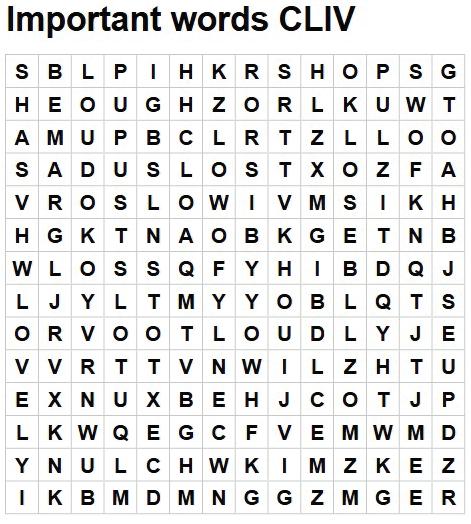




Vice President Bharrat Jagdeo has indicated that the approval by the United States EXIM Bank for the US$526 million loan for Guyana’s Gasto-Energy (GtE) Project was not conditional to the settlement of claims being made by the contractor, Lindsayca CH4 Guyana Inc (LNDCH4).
He made this declaration during his weekly press conference on Thursday at the People’s Progressive Party (PPP) Freedom House headquarters.
The Guyana Government and the US-based consortium of Lindsayca and CH4 are at loggerheads over a US$50 million claim by the contractor and the timeline for the completion of the project.
LNDCH4 was awarded the US$759 million contract in November 2022 to build the 300-megawatt Combined Cycle Power Plant and a Natural Gas Liquids (NGL) facility at Wales, West Bank Demerara – key components of the GtE Project.
However, there was a three-month delay in other components of the project that would affect LNDCH4Guyana’s delivery of the power plant in accordance with the contractual timelines. While the Government has extended the deadline by three months, the contractor is not satisfied and wants more time.
In addition, LNDCH4Guyana is making financial claims to the tune of US$50 million, stating that the delays would cost the company.
The Guyana Government has already rejected this financial claim thus resulting in the contractor activating the dispute resolution mechanism.
A three-member Dispute Avoidance/Adjudication Board (DAAB) that was set up to resolve this issue has already heard oral and written submissions from both sides and could potentially rule by this month, Jagdeo had previously reported. He had noted, too, that if either or both parties were not satisfied with that decision, then the matter would head to full arbitration.
But even as efforts are being taken to resolve this dispute, the Guyana Government has maintained that this issue would not impact the project and that works continue on the ground.
In fact, only last week, the Board of the US EXIM (Export-Import) Bank had announced its final approval of the US$526 million loan for the model GtE project.
During Thursday’s press conference, VP Jagdeo used the opportunity to hit back at critics, particularly from the political Opposition, who had previously condemned the feasibility of the project and now after being proven wrong by the US EXIM Bank, which found the project to be feasible enough to finance, have shifted their focus.
“For years, we took a beating that 1) it’s not feasible; 2), there is environmental impact study; and 3, the loan will not happen.
FROM PAGE 3
The new bridge would be a fixed, 2.65-kilometre, four-lane, high-span, cable-stayed structure across the Demerara River, with the width of the driving surface being about 23.6 metres. It will feature a bicycle lane, and would bring to an end the closure of vehicular traffic with a 50-metre fixedhigh span to cater for the free and uninterrupted flow of vessels. The river would be dredged along a 13.5-kilometre stretch to accommodate large vessels.
This new fixed high-span structure would replace the aged floating Demerara Harbour Bridge (DHB), which has outlived its lifespan by several decades.
With a length of 1.25 miles (2.01km), the current Demerara Harbour Bridge is a strategic link between the East and West Banks of the Demerara River, facilitating the daily movement of thousands of vehicles, persons and cargo. Hence, the new bridge across the Demerara River is a critical component of
the Government’s drive to expand and modernise Guyana’s transport infrastructure, and would address the challenges faced by users of the current bridge by providing safe, efficient, and effective crossing.
Upon completion, it is also expected to lay the groundwork for other economic opportunities for Regions Three and Four, including agriculture development, tourism, construction, housing and commerce.
More specifically, however, this new Demerara River bridge would provide better connectivity to the East Bank of Demerara corridor which leads to the country’s main port of entry – the Cheddi Jagan International Airport (CJIA) – and the capital city of Georgetown, as well as the East Bank to East Coast (Eccles-to-Ogle) Bypass Road on the eastern side of the river and the WBD roads, including the Parika-to-Schoonord road on the western side of the river.

All three were proven wrong [with the approval of the loan]… [But] having been proven wrong, they still want to run down the project so they shift now, speaking about the rising cost of the project.”
“I said last week, ‘oh the Exim Bank loan is about 25 per cent of the project, which is [totalling] about US$2 billion… They said Jagdeo now confess that the project has gone from US$2 billion to US$2.1 billion… [They're] nitpicking again… they had to find something [to criticise],” the Vice President asserted.
He went on to explain
that contrary to claims that the loan has high interest and would increase the country’s external debt, it has, in fact, a very competitive interest rate at just four per cent per annum. He compared this to the 40 per cent borrowing interest rate that the previous coalition regime had racked up during their term in office from 2015.
“Just imagine, at four per cent if this is burdensome, their track record was a 40 per cent interest rate in the local market. Imagine how much we would’ve had to pay if that was the case. So, it’s a lot of nonsense,” he
posited.
In fact, Jagdeo reiterated that the first five years of the loan from the US EXIM Bank would not attract any principal payments or interest. “So, you make no payments on the loan for the first five years… The interest component is capitalised and from 2031, that’s when you repay the principal and the interest, which would be about US$50 million annually,” he added. Moreover, Jagdeo pointed to the US EXIM Bank statement, which detailed that the GtE Project would save Guyana from importing one million barrels of oil per
year, replacing it with the natural gas that would be piped from the ExxonMobiloperated Stabroek Block offshore to the Wales site.
According to the Vice President, the treasury would save some US$100 million from not having to purchase bunker C fuel. He added that when the power plant starts to generate electricity and the price is slashed by half, as promised, Guyanese would save some US$250 million annually. Another US$138 million will be saved when Government sells Liquefied Petroleum Gas (LPG) or cooking gas, also at half price.
“So, if you add the two… you have savings by the Guyanese public from lowered electricity bill and from lowered cooking gas price of US$388 million per year. And guess what they’re complaining about, that we gotta pay US$55 million interest per year on the loan… In six years, you can pay back for the whole project from the savings alone to the Guyanese public…They talk about everything else, but would never tell you about how it will benefit the people of this country,” VP Jagdeo asserted. (G8)
AWest Coast Berbice (WCB) man is in custody assisting investigators who are probing the death of his brother on New Year’s Day.
Dead is 41-year-old Kiran Bacchus.
Reports are that the incident occurred about 01:30h on New Year’s morning at Section A Cotton Tree, WCB and resulted in the death of the father of three.
According to the Police, the incident involved Kiran Bacchus and his younger brother, 27-year-old Deepak Bacchus, who resides at the same address.
On Wednesday morning, the Police said, the older brother, Kiran was imbibing when he found out that his brother had prevented his wife from entering the yard where their mother was living. He reportedly forcefully entered the yard and confronted his brother.
This led to a physical altercation that ended with both men allegedly falling to the ground and the older brother’s head hitting the ground, causing him to bleed from his nose and become semi-unconscious.
He was taken to the New Amsterdam Public Hospital, where he died while receiving treatment, the Police said.
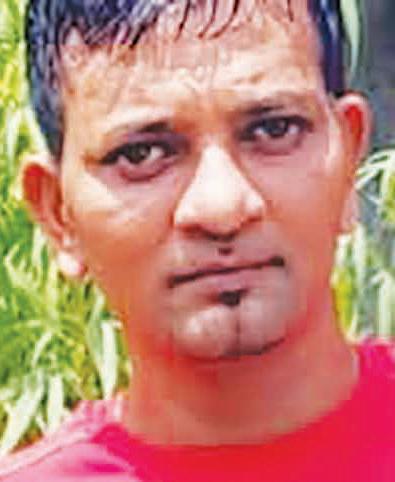
However, the dead man’s mother, Sookranie, said that her eldest son and his wife were at her home consuming alcohol and left and went to a neighbour’s house and continued to party.
She said they returned after she had locked her gate and this led to a confrontation and a subsequent fight.
According to the mother, during the altercation she tried to get between the parties and was pushed to the ground.
However, as Kiran tried to move away, he tripped over the hammock and fell hitting his head on the concrete floor.
A taxi was called and the injured man was taken to the hospital.
Meanwhile, in giving her account of what trans-
pired, Kiran’s widow, Seeta Churchand said she did not enter the yard. In fact, it was the mother who joined them at the neighbour's house and was dancing with Kiran.
Churchand said her mother-in-law subsequently left the party. Churchand added that she was engaged with the kids, including her son, who were playing with fireworks when she was told that her husband had gone over to his mother’s yard
and was injured.
“When I go, I see my husband on the ground and my brother-in-law give me two cuffs on my face and push me out of the yard.”
She said she was refused entry to the taxi which was taking her husband to the hospital.
Meanwhile, as the Police continue to investigate, an autopsy performed on the body of Bacchus revealed the cause of death as asphyxia. (G4)



The Police have retrieved a black plastic bag containing a handgun and three rounds of ammunition that was dropped by a man whom they were chasing in the wee hours of Thursday.
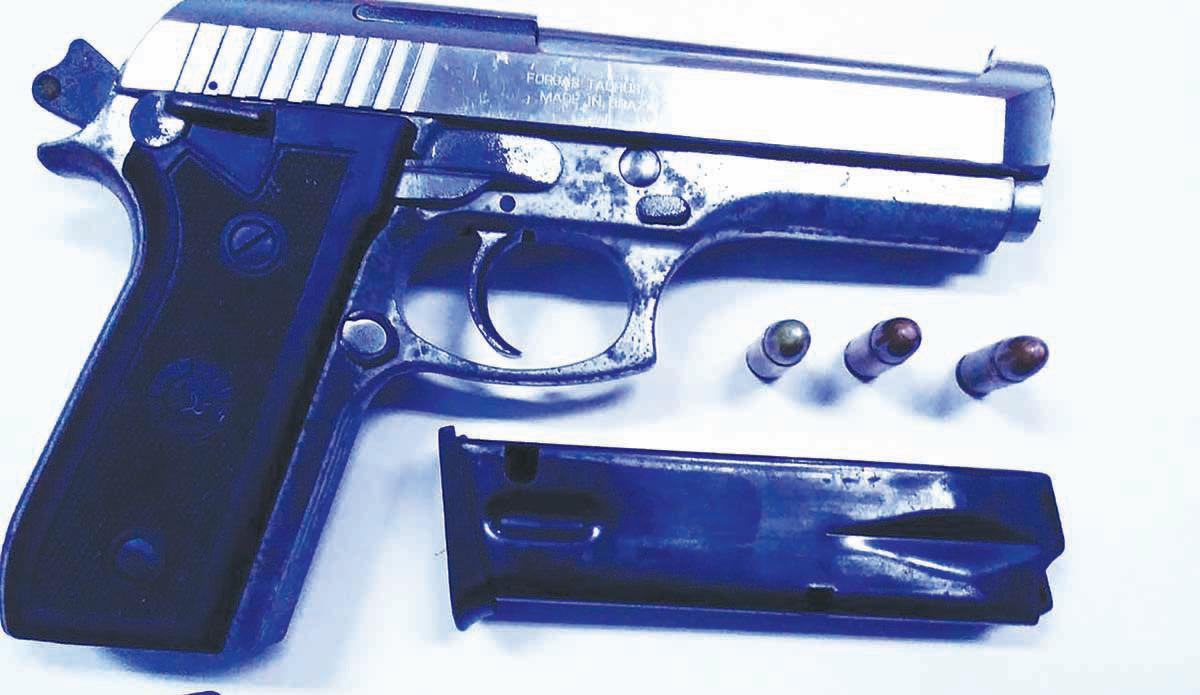
bid, the suspect reportedly dropped a black plastic bag, which was subsequently retrieved. Upon inspection, a black and silver handgun without a serial number, along with three matching rounds of 9mm ammunition, was found.
The area was combed for the suspect, but he was not arrested. Several persons in the area were questioned, but no useful information was received.

Based on reports received, Police acting on information went to Riverview,
Ruimveldt where they observed a male clad in a black jersey and a pair of long black trousers. Upon seeing the Police, the man started to run which resulted in the ranks giving chase.
As he made his escape
The handgun and ammunition were submitted to the ballistics section for processing to determine whether the firearm was used in the commissioning of a crime. Investigations are underway.
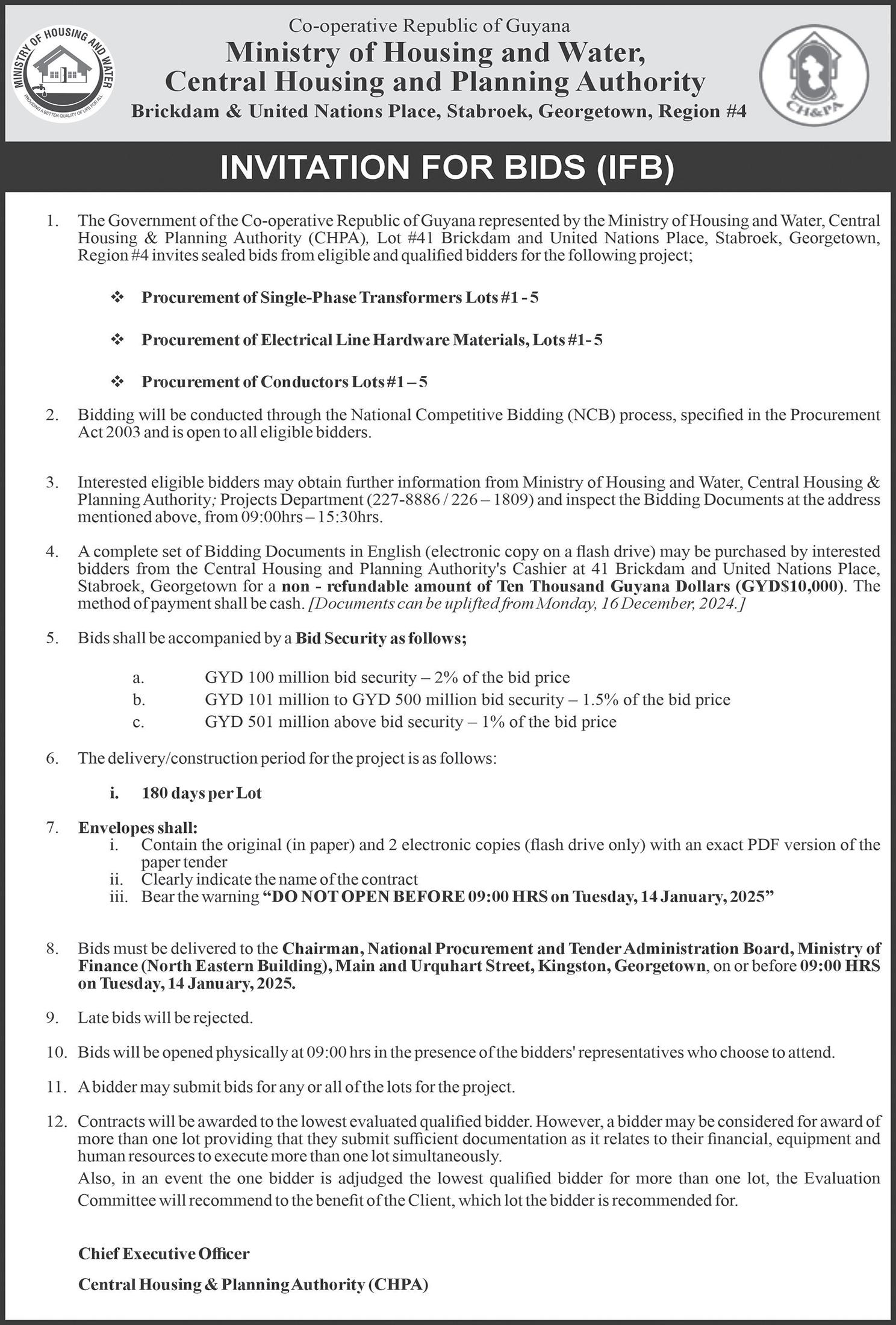
ell, for your Eyewitness and you, dear readers, 75 is a big number to reach in the birthday lottery. Not surprising, seeing that even though we’ve recently improved, our average lifespan’s still just a tad above 70 – with females being at least three years above that. Meaning we, of the male species, on the average, croak around 67 - since we clearly can’t deal with the pressures like our better halves can!! But for political parties to reach 75, as the PPP did on Jan 1st, is quite extraordinary in a country that emerged out of fire, so to speak.
When the PPP was born in 1950, there was extraordinary excitement by the young lions who were gonna beard the British Lion, which they figured had gotten old and decrepit after fighting two “great” wars. Their beacon was India –the “jewel in the (British) crown” – which had been given independence in 1947. But those young lions, led by Jagan, Burnham and company, should’ve been alerted to the machinations of the Old Lion – which had split India into two - to ensure they’d be at each other’s throats to deflect and exhaust their energies.
They were caught up in the euphoria of massively winning the 1953 elections merely three years after their launch, and first figuratively, then literally, lost their heads and were ejected after 133 days by the arch-imperialist Churchill!! The PPP was split into two factions - under Jagan and Burnham – and, like with India and Pakistan, so was Guyana. In India, the partition was implicit, as it was here after Burnham named his faction the People’s National Congress (PNC) and connived explicitly with the Imperialist successor – the USA.
And so it was that the PNC was handed the state to rule, even as the nation was divided down the middle into hostile camps!! We shouldn’t have to remind Guyanese that the PNC rigged elections for TWENTY-EIGHT years – with the Brits and Yanks winking on the sidelines! – to keep the PPP out.
The question must be asked: How does a party stay alive when it has no access to the largess that control of the state can deliver?? And the answer boils down to one man – Cheddi Jagan!! Even though in the wilderness, Cheddi –as he insisted on being called by one and all – kept the PPP viable as he crisscrossed the country indefatigably forming “fronts” in each sector to mobilize his base.
Even though he was a Marxist, who dubbed ethnicity “false consciousness”, he accepted his ethnic Indian base, that identified with his origins rather than his ideology.
The PPP has evolved, with Jagan’s succors recently jettisoning the ideology and openly accepting the need to court ethnic groups outside their base.
Another 75 with oil??
One of the signs of our oil-fuelled success is that we’re fast developing into a hot new job destination. During the last year, job fairs were held in NY and TT – at least your Eyewitness knows about these – and the responses, especially in TT, widely were enthusiastic. We’re not the world’s second fastest growing economy for nothing!! With our minuscule population, however, we shouldn’t be surprised there aren’t enough bodies to fill all the vacancies opening up in EVERY field.
But your Eyewitness thinks we just can’t have a freefor -all and allow the entire world to beat a path to our door. Every other country has “emigration policies” that are tailored to fit their circumstances. Like, for example, the Yanks, with their H-1B visa program - which allows workers qualified in certain technical fields, like engineering etc, to have priority acceptance ahead of others.
Your Eyewitness knows, for instance, that we need nurses, and are recruiting from Cuba. We MUST, however, ensure they can communicate in English!!
…violence
The Yanks just had another mass killing – and are agonizing whether it’s a “terrorist” killing. Well, this time, even though it’s been mentioned prominently that the killer is a Muslim with an ISIS flag, he’s also an American-born veteran. Domestic terrorist?



On this historic occasion of the 75th anniversary of the founding of the People’s Progressive Party (PPP), I extend heartfelt congratulations to the party, its members, and supporters past and present. This milestone is not merely a celebration of the longevity of a political organization, but is a recognition of the pivotal role the
PPP has played in shaping the history and destiny of Guyana. The PPP was born out of a vision for a free, independent, united and prosperous Guyana. Since its inception in 1950, it has remained a stalwart advocate for the rights of the working class; for justice, equality, and national development. The party’s contributions to
Guyana’s development and political evolution extend even to the period prior to our Independence, marking the party as a foundational pillar of our nation’s modern political history. The formation of the party reignited the nationalist struggle, giving voice, leadership and direction to the aspirations of a people yearning for freedom, dignity, and self-determination.
Among the PPP’s early and transformative achievements was its vanguard role in the fight for universal adult suffrage. This landmark victory, which enfranchised all adults, laid the foundation for democratic governance in Guyana. It affirmed the principle that every citizen, regardless of class, gender, or ethnicity, has an equal stake in the nation’s future. The PPP’s commitment to this cause epitomized its belief in the fundamental dignity and equality of all Guyanese.
During the dark era, when the democratic will of the people was trampled upon for nearly a quarter of a century, the PPP stood resolutely at the forefront of the struggle for the restoration of democracy. Through tire-
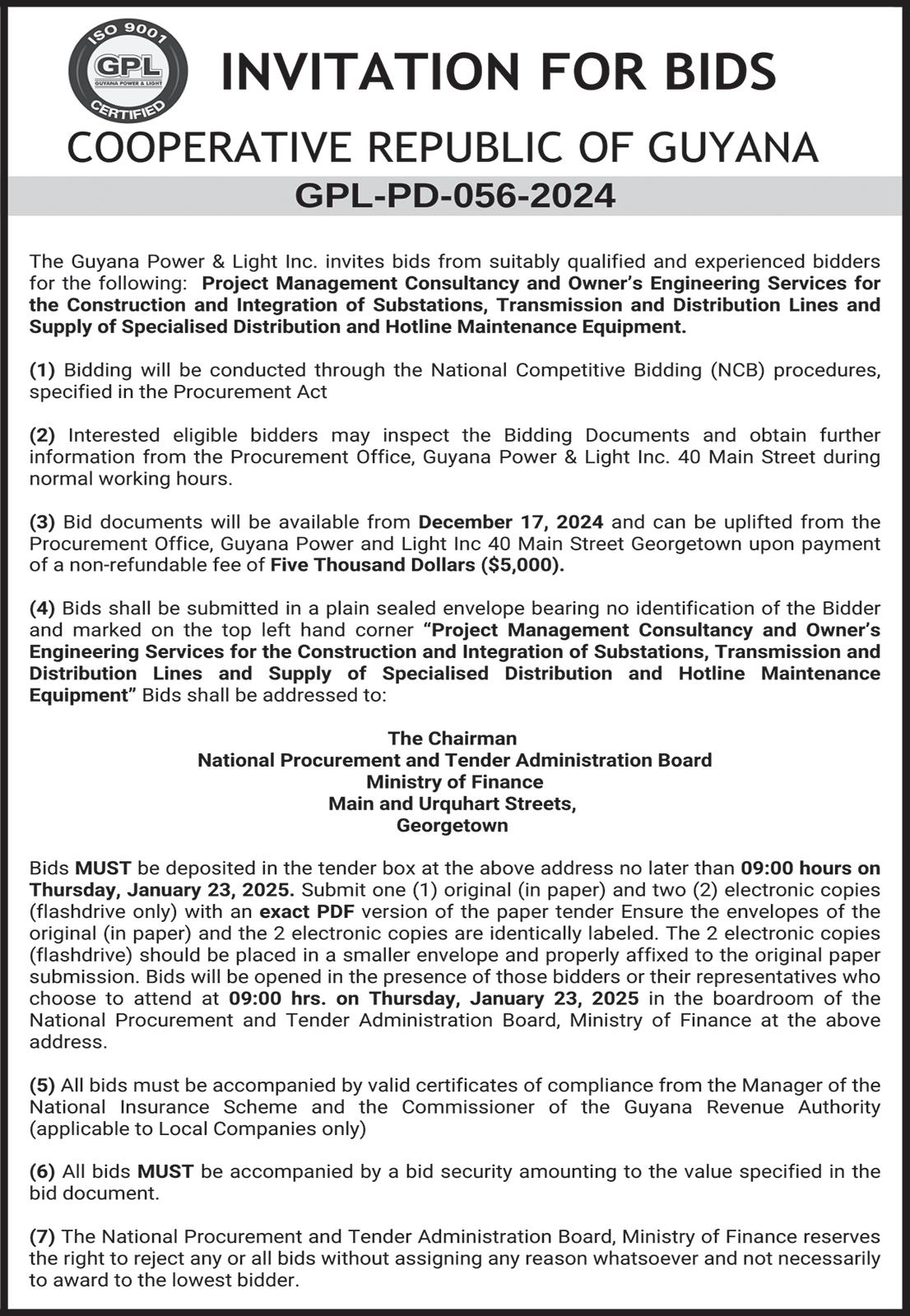
less struggle and sacrifices, the party championed the return of free and fair elections, culminating in its historic victory in 1992. The restoration of democracy brought with it the Herculean task of national reconstruction. The People’s Progressive Party Civic (PPPC) Administration took on the responsibility of rebuilding Guyana from the ruins of economic decay and despair. Through its policies, programmes and projects, the PPPC Administration laid the groundwork for economic recovery, improved social services and infrastructural development, rekindling hope among the people.
Beyond its national achievements, the PPP has also made significant contributions to the struggles of oppressed and colonized peoples. The PPP has championed causes such as decolonization, regionalism, anti-imperialism, national liberation, and an end to apartheid. In recognition of his extraordinary contributions to the struggles against racial oppression and colonial exploitation, Dr Cheddi Jagan, the former General Secretary of

the party, was posthumously awarded the prestigious Order of the Companions of Oliver Tambo. His later advocacy for a New Global Human Order highlighted the need for a fairer and more equitable world system. Throughout its history, the party has forged fraternal relations with progressive forces and movements, including those fighting for freedom and national liberation. None of these achievements would have been possible without the tireless support and unrelenting loyalty of the party’s members and its extensive grassroots support. On this, the party’s 75th anniversary, the party’s membership and sup-
porters deserve acclaim and applause!
The PPP’s commitment to the ideals of democracy, social justice and national unity continues to inspire hope and confidence in the future of our nation. Its vision for a Guyana wherein every citizen has a stake in its future remains as relevant today as it was at the party’s inception. I commend the PPP for its enduring service to our nation, and its dedication to the welfare of our people, particularly the working class. As the party looks towards the future, I am confident that it would continue to be a force for good, guiding Guyana to greater heights of prosperity and unity.


People’s Progressive Party (PPP) General Secretary Bharrat Jagdeo on Thursday responded to reports of other political parties contesting the 2025 General and Regional Elections, including a potential party led by publisher Glenn Lall.
“This is a free country and anyone can contest the elections, however, once you declare, your track record [will face scrutiny], the same way we face scrutiny every day,” Jagdeo said during his weekly press conference.
He was also asked about rumours that businessman Azruddin Mohamed, who was sanctioned earlier this year by the United States, will be running for President, saying that “I am not speaking about political ambition, but those who have declared.”
Contesting the polls comes with great scrutiny and the PPP General Secretary said those running for Government must be able to face tough questions and not become “crybabies” or play victims when confronted.

“I hope that when the tough questions come to the others who are going contest that they can answer,” he expressed.
Nevertheless, Jagdeo is confident that no matter many parties contest this year’s elections, the PPP will emerge the winner.
He pointed out that his party competed with 14 parties at the last general elections plus two at the regional elections and emerged the winner. During its time in government, he said, the PPP Administration remains committed to serving every Guyanese and will continue to do so.
“We’re not perfect, sometimes there are mistakes
made, but on the face of it, all that we’ve done for the people of the country, we have a moral and development framework that we work within,” he told media operatives and those tuned to his livestream of the press conference.
Jagdeo added: “I’m proud of the work done by the PPP. We have been able to make sustained progress and have grown… [we] won the majority (2020) and now we’ll have a bigger majority (2025).”
The PPP is celebrating 75 years since its inception in 1950.

Assistant Superintendent of Police Rodwell Sarrabo has filed a lawsuit seeking damages in excess of $80 million for defamatory statements made by overseas based-Guyanese Rickford Burke on social media.
The lawsuit, filed earlier this week in the High Court, states that Burke made false and damaging remarks that have significantly harmed Sarrabo’s reputation, including accusations of torture, murder, and conspiracy to obstruct justice.
According to documents seen by this publication, Sarrabo is suing for $10 million each for several Facebook posts allegedly published and/or circulated by Burke on January 11 and 19, 2024, and on February 10, 11, 13 and 14, 2024.
Sarrabo has also filed for a “permanent injunction restraining the defendant, whether by himself, his ser-
howsoever, to forthwith permanently remove Facebook posts published and/or circulated by him on the 11th day of January, 2024; 19th day of January, 2024; 10th day of February, 2024; 11h day of February, 2024; 13th February, 2024, and 14th day of February, 2024 in respect of the claimant.”
Sarrabo is also requesting an “interest at a rate of 6 per cent per annum from the date of filing to the date of judgment, and thereafter at a rate of 4 percent per annum from the date of judgment until fully paid”, in addition to “costs; and such further or other orders as this Honourable Court may deem just”.
Sarrabo’s lawyers have stated that the damages being sought are meant to compensate for the long-term reputational damage and financial losses caused by Burke’s words.
It was noted that state-

vants and/or agents, or otherwise howsoever, from posting, publishing, sharing or otherwise causing same to be done in any Facebook post, statement, contention, allegation; or similar words defamatory of the claimant.”
Moreover, the cop is seeking an order “compelling the defendant, whether by himself, his servants and/or agents, or otherwise

Sarrabo’s legal team has contended that Burke’s statements, which were made publicly and were widely circulated on various media platforms, are not only unfounded, but are also malicious in nature.
In August 2024, the Chambers of the Attorney General of Guyana asked the United States for assistance as it sought to institute a series of charges against Burke for several offences he had allegedly committed on social media.
Burke has also been implicated in Guyana in an extortion conspiracy targeting a local businessman.
In 2022, Gary Eleazar, Dorwin Bess and Alex Wayne were each charged with two counts of conspiracy to commit a felony against businessman Afras Mohamed. Burke has also been charged with the same offences in 2023. It has been alleged that he conspired with the other three individuals to extort money from the businessman. Burke has since denied being involved in extortion via social media. This case is ongoing.
ments made by Burke either imply or accuse Sarrabo of being “a corrupt and dishonest police officer”; of being “influenced by members of the Executive to harass and/ or victimize citizens or other accused persons”; of being one who “conspires with others to oppress and unlawfully prosecute citizens”; of being one who “is guilty of conduct which is in breach of the Laws of Guyana”; of being one who “is dishonest and culpable of conduct which falls below the standard of members of the Guyana Police Force”, among other things.


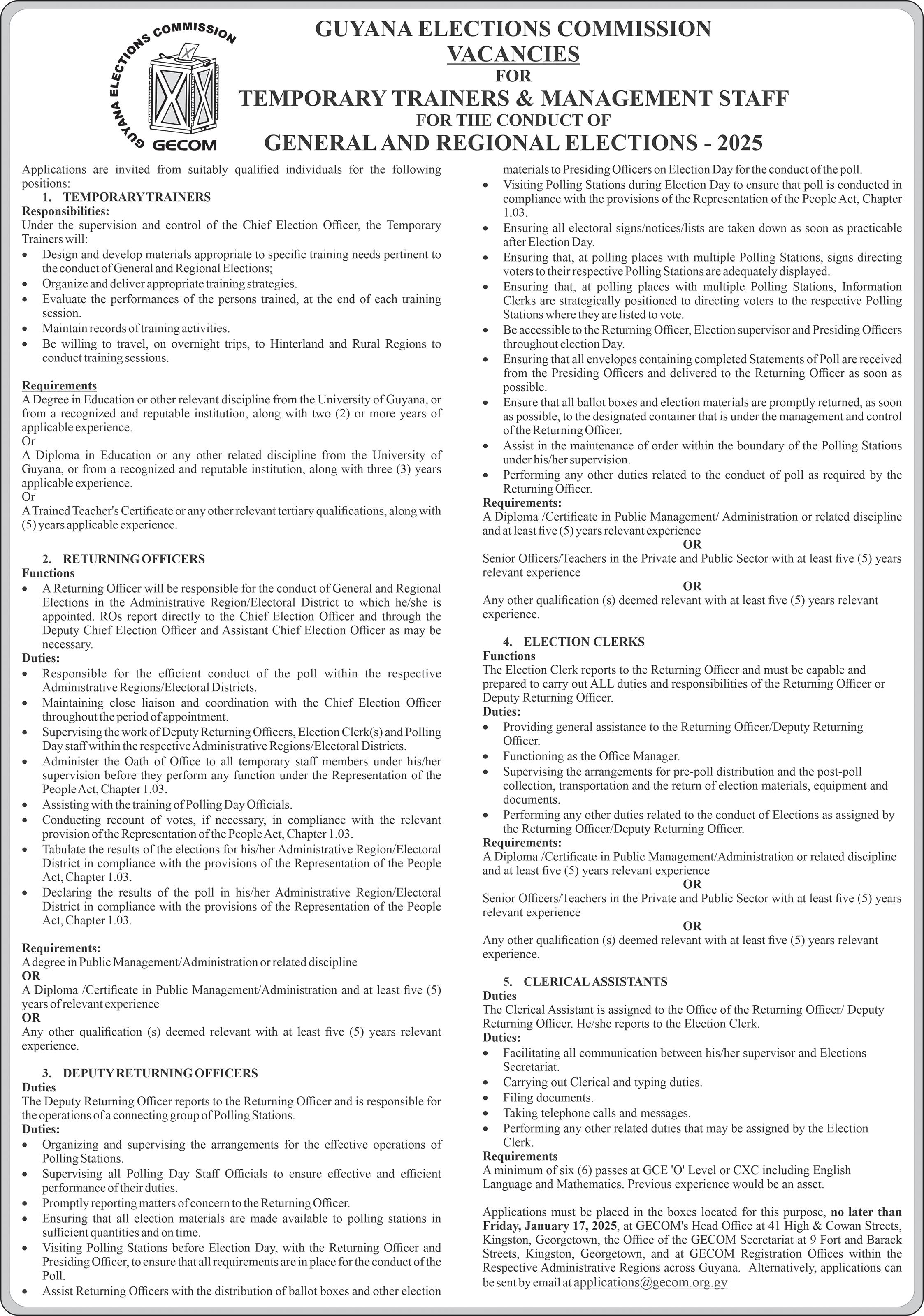


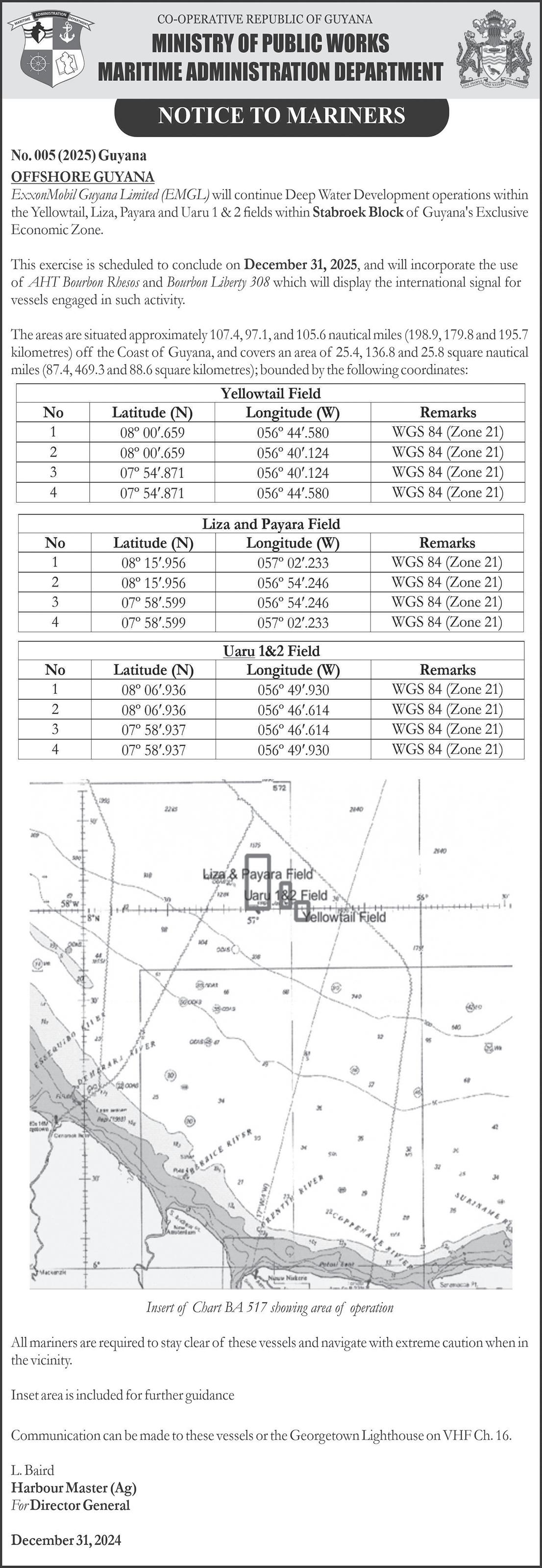

Reinsford Kenny, a miner, was on New Year’s Day stabbed to death during an altercation at Kumung Kumung Backdam, Puruni River, Region Seven (Cuyuni-Mazaruni).
The suspect, lpha Osafha McPhoy, also known as “Bat”, has since confessed to the crime, but claimed that he acted in self-defence.
Preliminary investigations revealed that both the suspect and the victim were employed with Rhyburn Elcock, a businessman, who stated that on the day in question, the now-dead man arrived at his shop intoxicated and started to behave disorderly.
As such, he was removed from the premises, but Elcock later learnt that the

man was stabbed to death by the suspect during a commotion.
Jermain Sampson, according to Police, reported that he attempted to make peace between the two men, but he too sustained stab wounds. The lifeless body of Kenny was found lying motionless with an incision to his chest.
At the scene, a left-side Havaianas slipper, a black
and red left-side Guangda slipper, and a black and yellow flap hat were found.
The suspect McPhoy was subsequently arrested and admitted to fatally stabbing Kenny during an altercation, claiming it was in self-defence after the now-dead man allegedly attacked him with a knife.
The suspect remains in custody as investigations continue.
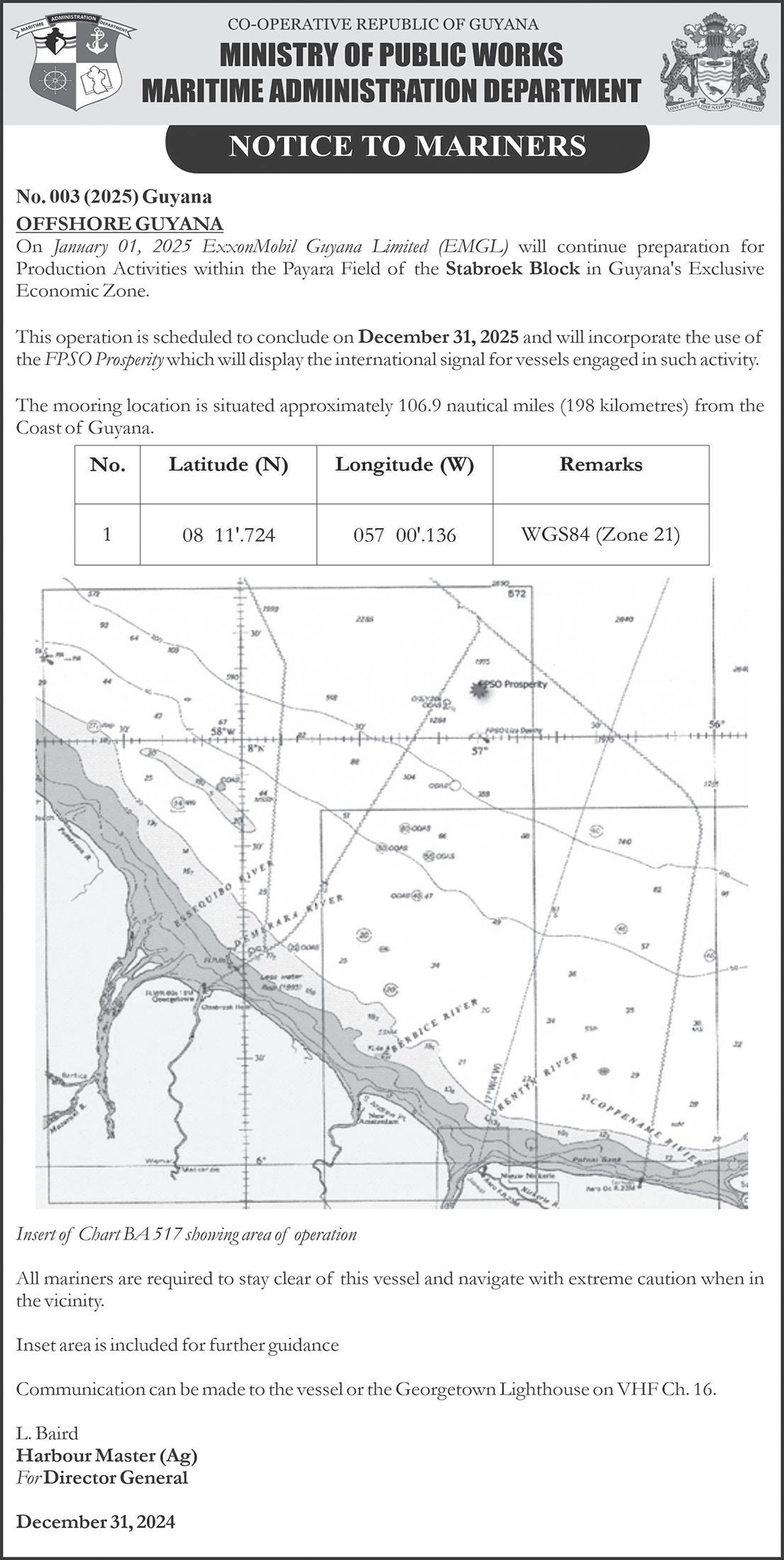
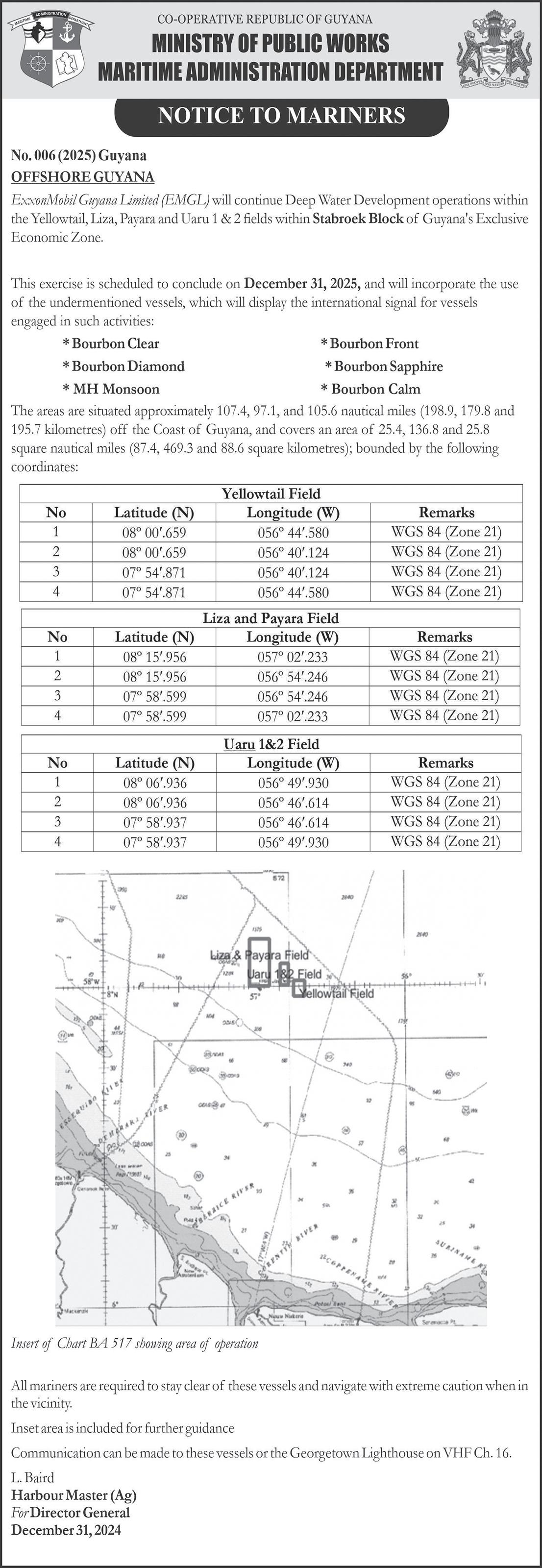

Afamily New Year’s Day outing at Lake Eleven in Huis t’Dieren, Region Two (Pomeroon-Supenaam) ended abruptly after a 36-year-old man went into the water and never resurfaced.
Despite a comprehensive search for the man’s body, it was never pulled from the lake until Thursday. The Police have since identified the dead man as Gowkarran Inderjeet, also known as “Karran” or “Bud,” of No. Three Village, West Coast Berbice (WCB).
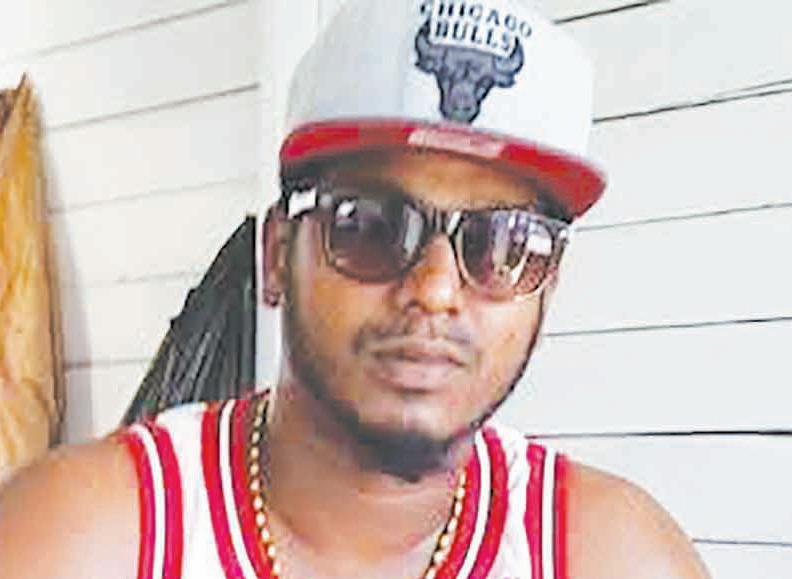
Based on reports received, Inderjeet had travelled to the Essequibo Coast to spend time with his wife, son and other family members. During the visit, a family outing was planned as he was only in the region for a short time.
son remained at the surface.
Guyana Times understands that persons witnessed what was happening and rushed to aid the father and son. They only managed to save the child, as, unfortunately, the father disappeared beneath the black water.
An alarm was raised and several search parties were established, but came up empty-handed as the area started to get dark. The search continued on Thursday and it was then the man’s lifeless body was pulled from the lake.
As they were in the water, the now-dead man reportedly veered off into the deep part of the lake and went underwater while his
However, at about 16:30h on Wednesday, Inderjeet and his six-yearold son ventured into the lake for a swim. At the time, he was carrying his son on his shoulder.
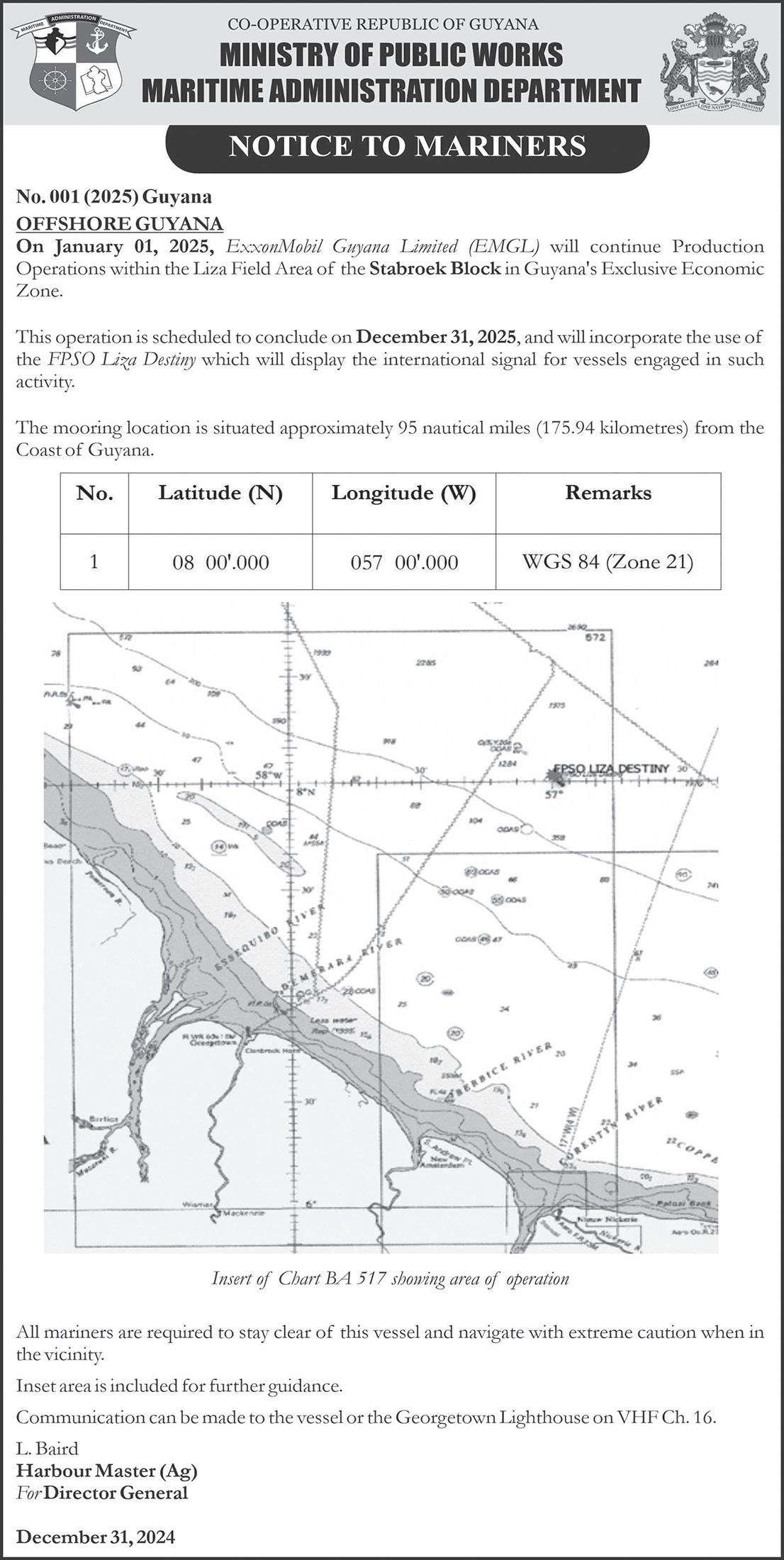
The body was taken to the Suddie Hospital Mortuary to await a post-mortem. (Raywattie Deonarine)

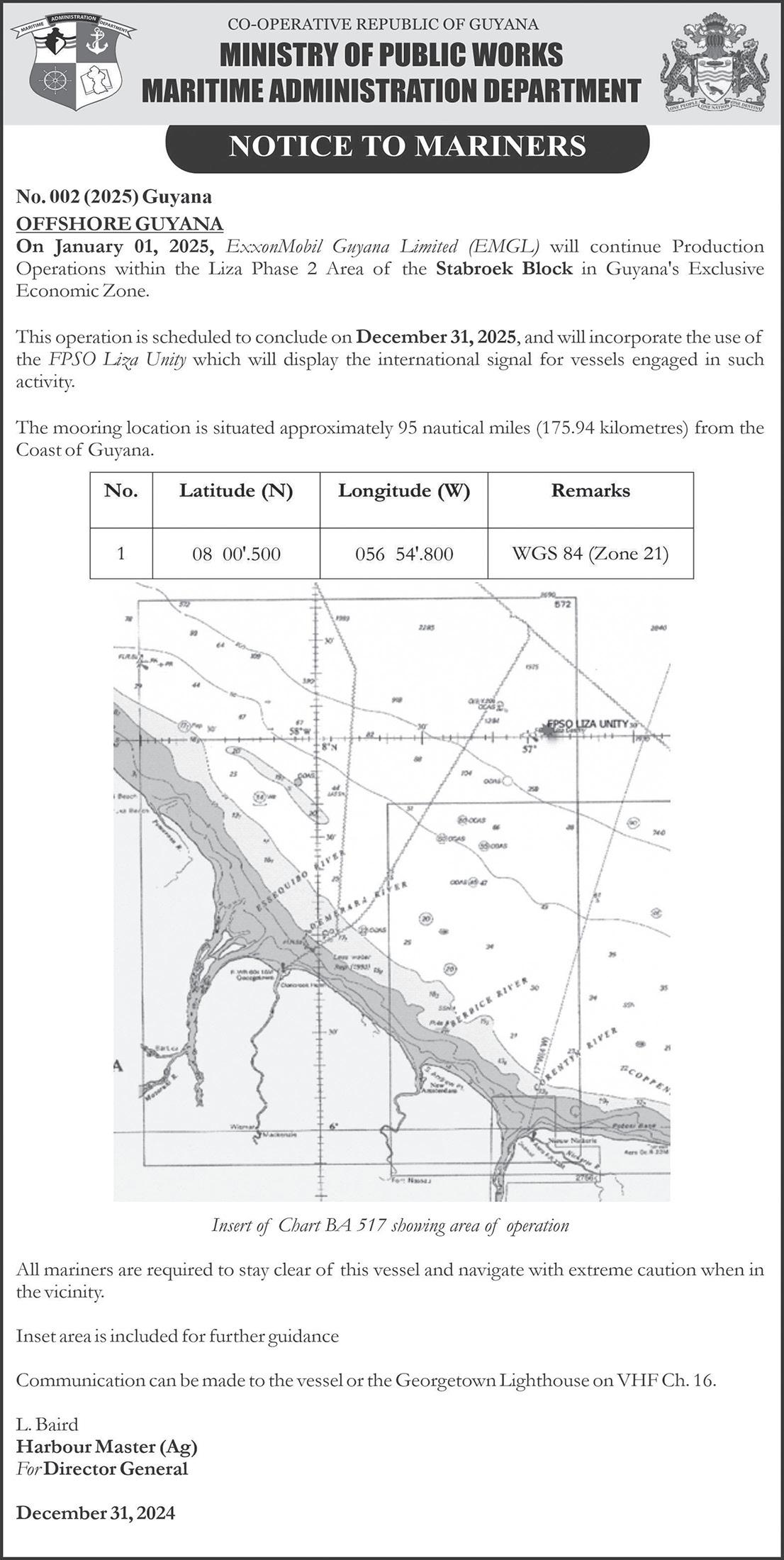

Regional crime concerns, such as obtain in nearby Trinidad and Tobago (T&T) – which has recently announced a State of Emergency to deal with heightened gang violence – are causing Guyana to not only keep a close eye on the situation, but strengthen its own border security and citizen protection strategies.
During his year-end press conference on Tuesday, President Dr Irfaan Ali was asked whether Guyana has beefed up the monitoring of its borders, and whether countries like Trinidad have requested Guyana’s assistance in dealing with their security problems.
In response, President Ali confirmed that the threat level to Guyana posed by regional gang violence is indeed being assessed. Additionally, he noted that, as a member of the Regional Security Service (RSS), Guyana is privy to discussions on the regional security threat.
The RSS was set up through an agreement within the Caribbean Community (Caricom) for the defence and security of the Eastern Caribbean region; and Guyana was asked to become a member of the steering group of one of the RSS’s operating arms back in 2022.
“As you know, we’re a
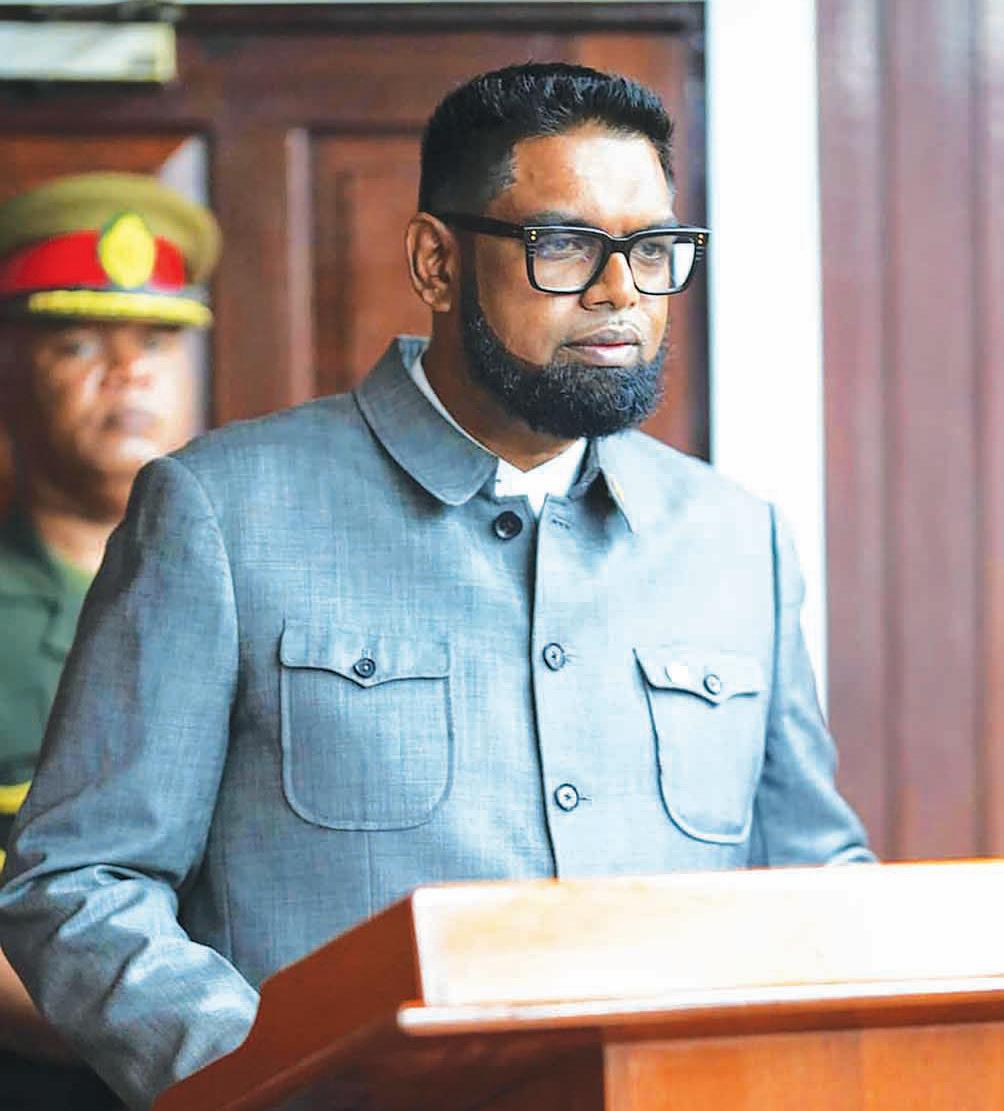
that our collective system protects our population,” President Ali explained.
In terms of beefing up local security systems, the President disclosed, plans include upgrading immigration systems with electronic gates for advanced entrance monitoring, and expanding the Safe City Initiative nationwide.
“…the movement of gangs, the transfer of weapons, the expansion of gangs; and we have to be mindful of this. So, what we have done in 2024 is expand the Safe
ployed during the Christmas holidays as part of the ‘eye in the sky’ programme.
“I don’t know how many of you paid attention, but during the Christmas holidays, they were all over in the streets, giving back real time information and footage to the control centres (on) what is happening,” he declared.
“We also launched a new programme, where we have the ‘Citizens Watch’, where we have connected the surveillance CCTV cameras, the big screens outside

member of the RSS, so I know there are discussions going on within the regional security architecture. And, of course, there are measures to look for consequential effects. So, yes, the security architecture of Guyana met yesterday [Monday] and there were discussions examining some of the possible threats, and ensuring our systems are rigid enough to avoid those threats. But (we’re) working also with regional partners to ensure
City Project. We have stateof-the -art surveillance system in many of the important locations now, especially the urban centres,” he further stated.
The President noted that, so far, Government now has more than 500 body cameras available to officers who are fighting crime and those who are involved in traffic management. Government has also invested in stateof-the -art drones, some of which were actually de-
Stabroek, for example, in key areas, so that everybody can be looking at a screen and seeing what is happening in the streets, and what is happening and identify potential threats,” the President said.
President Irfaan Ali has praised the efforts of the Guyana Police Force and stressed the importance of individual responsibility in maintaining safety on the roads and within communities.
These advancements, he explained, highlight a collaborative approach between law enforcement, Government initiatives, and active citizen participation.
“So that also has brought tremendous results. We are also modernizing our fleet. As you know, we have 19 advanced marine vessels now; that is: fast boats that (are) operating along our riverways,” the Head of State added.
After a weekend of gang violence that resulted in several deaths, and after a year (2024) that has seen over 600 murders, the Government of Trinidad and Tobago has declared a state of emergency, during which the Trinidad and Tobago
Police Service (TTPS) would have increased powers at their disposal to arrest the spiralling crime situation.
These emergency powers include the ability to search premises and individuals without warrants, once reasonable suspicion of criminal activity exists. Additionally, law-enforcement authorities would be able to detain individuals for up to 48 hours without charge. (G3)



The Ministry of Human Services and Social Security (MHSSS) has taken some 72 children off the streets in 2024; and has provided these children, aged between five and 16 years old, with shelter, healthcare, and educational opportunities.
This has been revealed by subject Minister Dr Vindhya Persaud during an end-of-year press briefing on Tuesday, wherein she explained that programmes implemented by the MHSSS are part of a broader effort to combat homelessness and improve the lives of vulnerable children across the country.
“Our work with street children focuses not only on removing them from unsafe environments, but also on addressing the root causes of their situation,” Minister Persaud elaborated, while adding that the children had access to critical services, including healthcare and education, to help them transition back to stable home lifestyles.
“We are still working with these families, providing them with access to employment opportunities to help them create a stable environment for their children,” the minister added. “At the close of the year, we are proud to announce that none of these children are back on the streets.”

In addition to being offered shelter and support, 50 of the rescued children have benefitted from cognitive behavioural therapy, she disclosed.
“Our goal is to improve their quality of life and address underlying behavioural issues,” Dr Persaud has asserted.
Minister Persaud has asserted that the focus of the MHSSS extends beyond just removing children from the streets to ensuring that their lives are improved holistically. She has also underscored the importance of the Early Childhood Development Programme of the MHSSS, describing it as “a significant step in the right direction.”
The programme targets children before they begin school,
starting at 3 years and 9 months old. The MHSSS has also trained personnel for more than 300 daycare centres across the country to provide better early childhood education.
“We are focusing on children before they begin school, ensuring that trained persons are in place to work in daycare centres and provide the support needed for early childhood development,” she explained.
Further, the MHSSS has made significant progress in licensing children’s homes across the country. Dr Persaud shared that eight of the 16 children’s homes in Guyana have now been registered, and will soon receive their licences.
“We aim to ensure that

Chief of Defence Staff, Brigadier Omar Khan, on Wednesday announced the promotion of 525 ranks of the Guyana Defence Force (GDF) and the Guyana National Reserve.
These promotions were done in accordance with Part III, Section 16 of the Defence Act, Chapter 15:01 of 1977.
The promoted ranks include three Class Two Warrant Officers being elevated to Acting Class One Warrant Officers, while one Class Two Warrant Officer has been made substantive.
Two substantive Staff Sergeants have been promoted to substantive Class Two Warrant Officers, and three substantive Staff Sergeants have been pro-
moted to Acting Class Two Warrant Officers.
Further, 10 acting Staff Sergeants have been made substantive, while eight substantive Sergeants have been promoted to acting Staff Sergeants, and 42 Sergeants have been made substantive.
In addition, 57 Corporals have joined the Senior NonCommissioned Officer Corps through their promotion to acting Sergeant, while 62 Corporals have been made substantive.
Furthermore, 116 Lance Corporals have each been elevated to acting Corporal, 75 acting Lance Corporals have each been made substantive, and 49 Privates have each been promoted to the rank of Acting Lance Corporal.
Coast Guard ranks of the GDF have had 32 promotions, including one Chief Petty Officer having been made substantive, two Senior Petty Officers having been promoted to acting Chief Petty Officers, and one Senior Petty Officer having been made substantive. An additional 28 other ratings have promoted or been made substantive in their respective ranks.
The Guyana National Reserve has seen 65 of its ranks being promoted.
The promoted personnel have been congratulated and commended for their dedication, hard work, and commitment to the service of the GDF, and ultimately the nation.
trained individuals are working in these homes, providing the highest quality of care,” she noted.
A key initiative for 2024 is establishment of the Central Adoption Authority, in compliance with the Adoption of Children (Amendment) Act of 2021. This authority enables resumption of inter-country adoptions in keeping with the Hague Convention for the Protection of Children.
“This is a significant step
for our country,” Dr Persaud emphasized, highlighting that it aligns Guyana with international adoption best practices.
Dr Persaud has also acknowledged the vital support received from agencies like UNICEF, which has been instrumental in the Ministry’s success.
“Training all our staff in relevant areas is essential, so they are better equipped to deal with existing and emerg-
ing social issues,” Minister Persaud has said.
Reiterating that commitment of the MHSSS to the wellbeing of Guyana’s children remains steadfast, Minister Persaud has said, “Our work ensures that no child is left behind. We are proud of the progress we’ve made this year, but our commitment to improving the lives of vulnerable children will continue in 2025 and beyond.”
coconut production increased by 7113 acres

Guyana’s coconut industry is steadily growing, with some 33,000 acres of land under cultivation in 2024.
During his end-of-year press conference on Monday, Agriculture Minister Zulfikar Mustapha, in highlighting the statistics associated with this sector, disclosed, “We have seen success in the coconut industry…Coconut has gained prominence, and we have seen a lot of improvements in coconut cultivation. As a matter of fact, in the last four years, we have increased coconut production by 7,113 acres since 2020. The total acreage under cultivation as of December 2024 is approximately 33,000.”.
In particular, Mustapha stated that the Hope Coconut Estate, East Coast Demerara, performed significantly well in producing thousands of coconut seedlings.
“In 2024, the Hope Coconut Estate performed exceptionally well, having produced some 51,320 coconut seedlings by the end of December 2024,” he said.
The importation of seedlings was also emphasized, as the industry recorded importation of a large number of foreign-styled hybrid coconuts, which contributed to the bolstered production in
Guyana.
“In terms of seed nuts, we have also imported 63,000 high-yielding Brazilian green dwarf, Philippine green dwarfs and Brazilian hybrid seed nuts; seed nuts to boost Guyana’s coconut production capacity,” Minister Mustapha noted. He added, “We have been working with farmers across the country, especially in places like the Pomeroon, to enhance coconut cultivation there. As a result, we have seen increased production from farmers in those areas.”
Farmers are also using husks from the plant to enhance the growth of coconuts.
Meanwhile, as farmers maximize their efforts, the Agriculture Ministry has recorded a surge in value-added products being generated from the coconut industry.
“Over the last four years, we have seen a lot of value-added products being generated from the coconut industry. We are seeing that the Hope Coconut Estate is producing fibre and coconut pea from using the coconut husks throughout the year. This enhances plant growth and helps farmers improve their yields.” the minister concluded.
Earlier this year, during an outreach to Pomeroon
riverine areas in Region Two (Pomeroon-Supenaam), Mustapha had announced that Government would make available some 3000 high-yielding coconut plants to local farmers. Over 120 farmers have each received 25 Brazilian green dwarf coconut plants as part of the first phase of a larger project. The country continues to produce coconut on a large scale, to make it one of the most significant crops in the nation as a result of the sector’s diversification.
For 2023, Guyana received some 13,000 high-yielding Brazilian green dwarf coconut seed nuts, worth $12 million, to expand coconut production. There are ten coconut nurseries spread across regions One, Two, Three, Four, Six, Nine, and 10, with the Agriculture Minister recently announcing that the Government intends to expand the initiative to other regions due to the excellent potential for coconuts. Government has also been emphasising the enormous potential for Guyanese farmers to export in the substantial market, which includes the Caribbean as well as North America and Europe, given the high level of interest in the coconut industry. (G2)

“It’s a great
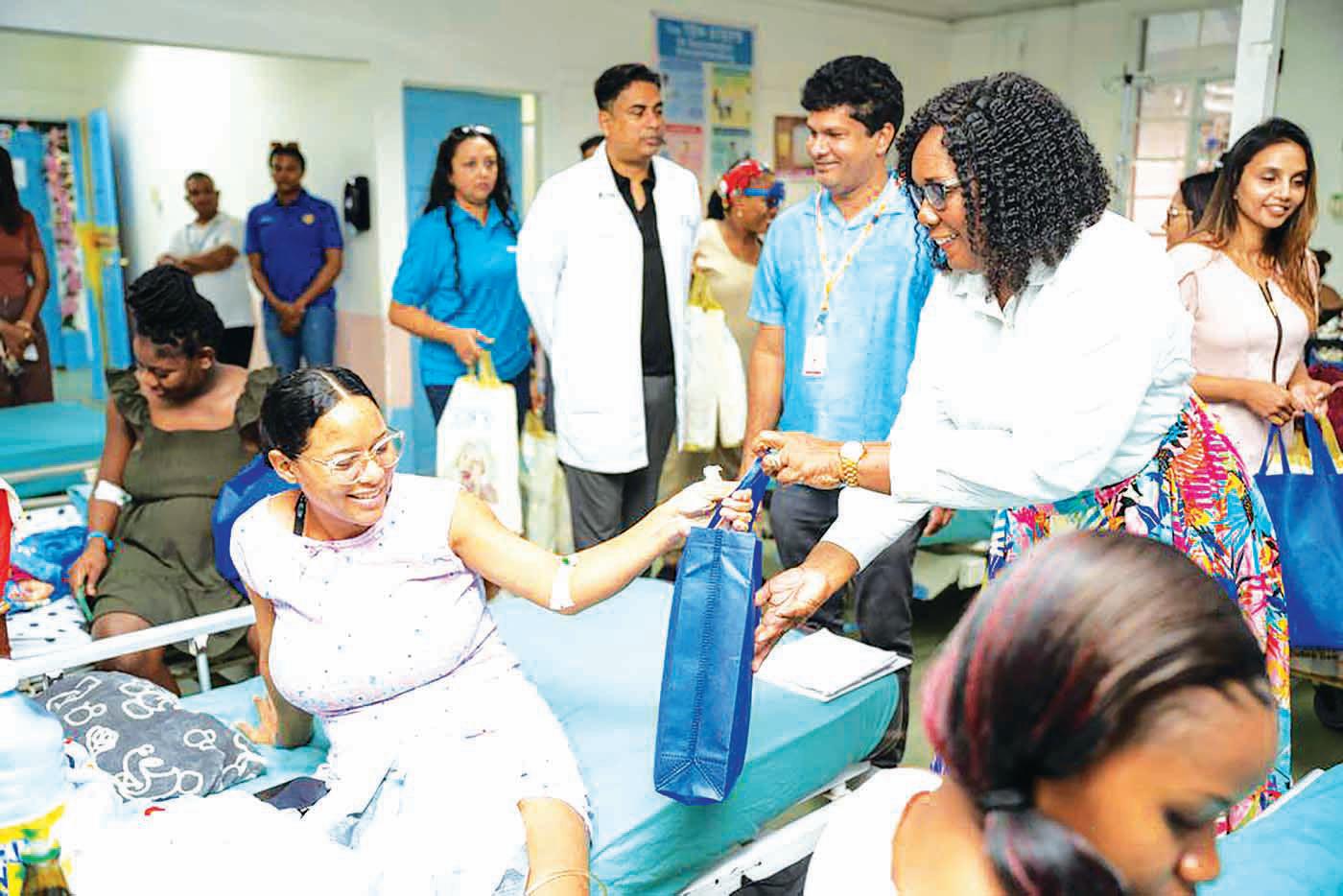

Mrs Mignon BowenPhillips, wife of Prime Minister Brigadier (ret'd) Mark Phillips, visited the maternity ward of the Georgetown Public Hospital (GPHC) on Wednesday and distributed essential supplies to new mothers and their New Year’s babies.
Reflecting on the significance of the visit, Mrs Bowen-Phillips highlighted Government’s ongoing commitment to healthcare improvement, particularly advancements in maternal care at GPHC.
“It is the start of a brand-new year, and it's always a good time to give special cheer to the new moms (and) the repeat mothers, who have been blessed to nurture another human be-

ing. It’s also important because it sends a spotlight on the resources that the Government has been giving to improve our healthcare facilities, and also it helps us to understand the nature of the work that the doctors and the nurses at the Georgetown Hospital do, especially those difficult cases,” she said.
She also noted the broader healthcare developments underway across the country, including the ongoing construction of new regional facilities and significant investments aimed at benefitting all Guyanese.
“It’s a great time to be born a Guyanese. Our Government is putting a lot of resources into our healthcare system, so all these newborns are going
to be enjoying improved healthcare services,” she declared.
The critical contributions of community health workers and hospital staff in supporting new mothers during their journey have also been highlighted by Mrs Bowen-Phillips. “I would also like to thank the community workers who would have supported all these mothers at the neighbourhood level. And finally, to the staff, management, and administration of the Georgetown Hospital, who finally brought them through to safety, ensuring that they are safely taken care of, and they’re all going to be going home with a bundle of joy,” Mrs Bowen-Phillips declared.
The number of pensioners that are being catered to by the Government has increased by 17% in 2024, thus marking the highest recorded figures to date in a single year.
This means that citizens have reached the age of 65 and would have started to receive the necessary benefits. With this increase in pensioners countrywide, the Government remains committed to supporting this vulnerable group through expanded programmes and services.
“Our Government has been steadfast in its efforts to support pensioners. Since taking office in 2020, we’ve prioritized our seniors by increasing old-age pensions by 75% and implementing measures to ease their financial burdens,” Minister Persaud related during a recent press conference.
She added that plans are already underway to further

increase old age pension in the coming year.
In addition to pension increases, the Ministry has restored water and electricity subsidies for seniors, and provided health vouchers in collaboration with the Health Ministry.
Over 1,000 pensioners have also received test-
ed spectacles through the ICAAR programme.
Highlighting efforts to engage and empower the seniors, Dr Persaud announced the launch of a transformational programme aimed at narrowing the digital divide.
“We are teaching seniors how to use smartphones, fill
out forms online, and engage in other practical digital skills. This initiative aligns with our Sustainable Development Goals and our vision for a digitally inclusive society,” she said.
The Ministry also celebrated its centenarian pensioners through its Century Club, which connects and
supports citizens who have attained or surpassed 100 years of age. Dr Persaud recalled meeting two pensioners, aged 100 and 105, and reaffirmed Government’s commitment to honouring and aiding the elderly.
The Ministry has extended its reach to other vulnerable groups. Public assistance beneficiaries have been increased by 100 per cent, with improved systems allowing seamless applications for permanent disability benefits.
"Beneficiaries now only need to apply once, simplifying the process," Dr. Persaud has said.
The Ministry has also expanded direct payment services to over 1,500 communities, ensuring accessibility for bedridden individuals through its Shut-in Registry. Social service officers, numbering 94 across all regions, play a vital role in delivering these services,
often travelling great distances.
Dr Persaud revealed progress in combatting gender-based violence, noting a 33% decrease in domestic violence-related murders this year. This success stems from initiatives such as the 914 Hotline, which received 14,000 calls, including over 1,500 cases related to domestic violence and child abuse.
The Government’s focus on pensioners is part of a broader effort to improve the quality of life for all citizens.
“We remain committed to supporting our seniors, ensuring they receive the care and resources they deserve,” Dr. Persaud has affirmed.
With plans for further pension increases and continued program expansion, 2024 has set the stage for a future wherein Guyana’s elderly population thrives.

Over 300,000 migrants crossed the Darien Gap into Panama in 2024, 42 per cent fewer than the record number who made the perilous jungle crossing from South America a year earlier, Panama's migration authorities told Reuters on Thursday.
The dangerous Darien Gap connects Colombia with the Central American nation of Panama and increasing numbers of migrants were
making the journey north to reach the United States.
Panamanian President Jose Raul Mulino has taken a harder stance on migration since taking office last July, including fencing parts of the Darien with barbed wire, imposing fines and using flights funded by the United States to deport migrants.
Officials with Panama's National Migration Service told Reuters 302,203 migrants crossed the Darien
last year, down 42 per cent from the record 520,085 in 2023. Some 69 per cent of migrants in 2024 were Venezuelans, they said.
Many Venezuelans have been fleeing a prolonged economic collapse in the once-prosperous South American oil-producing nation.
"We are working every day to ensure that illegal migration does not reach Panama City or the rest of the country," Mulino said in a speech to lawmakers on Thursday.
Mulino added that his government has deported 1548 migrants on flights arranged through an agreement with the United States.
However, 209,000 Venezuelans who crossed the Darien last year were permitted to continue their journey as Panama and Venezuela suspended direct flights after Venezuela's disputed July election. (Excerpt from Reuters)
Incoming Chairman of the Caribbean Community (Caricom), Mia Amor Mottley’s main focus in 2025 is to get the Caribbean Single Market and Economy (CSME) back on track.
She made that clear in a New Year’s message to the region.
The CSME’s programmes were curtailed due to the COVID-19 pandemic in the Caribbean in 2020.
“Central to our mission must be resuming the full implementation of the Caricom Single Market and Economy (CSME). We paused our coordinated actions on this noble but critical mission as we applied all that we could muster to fight COVID-19 and its trail of economic and social upheaval. But five years on, we must resume our work on the CSME.
“For this is not merely an economic agenda. It is a vision of unity and opportunity for small states who know that we can achieve so much more together than we do individually. Full realisation of the CSME, including above all else, yes, the free movement of our nationals is essential for unlocking the true potential of our people and our economies,” Mottley said in her message.
She said it was a necessity for Caricom to attain and go beyond the target it set for food and nutritional security, best exemplified by the “Vision 25 by 2025” agenda in 2021.
“We must now focus to apply the few, but necessary recommendations of the distinguished Caricom Commission on Economy, who reported to us in the middle of the pandemic,
when we were justifiably distracted. The pooling of our sovereignty must also be better addressed by the pooling of our efforts, from investment to skills to procurement. We can do better together.
“We must also confront the injustices of the global financial system, which continue to marginalise Small Island and Low-lying Developing States. Unjust blacklisting practices and insufficient access to concessional financing hinder our sustainable development efforts,” Mottley added.
She said Caricom would persist in advocating for reforms championed in the Bridgetown Initiative and working with others, like the 73 vulnerable countries in the Climate Vulnerable Forum. (Excerpt from Nation News)
Brazil has started examining the black box recorders from a Brazilian-made jetliner that crashed in Kazakhstan, killing 38 of the 67 persons aboard, the air force said Thursday.
The Azerbaijan Airlines plane, an Embraer 190, crash-landed on Christmas Day as it flew to the Chechen capital Grozny in southern Russia.
The Brazilian air force said in a statement that the data from the recorders would be extracted and analysed as soon as possible.
These devices captured cockpit dialogue and flight data from the plane. They are being examined by the Aeronautical Accidents Investigation and Prevention Center, a unit of the Brazilian air force.
Azerbaijani President Ilham Aliyev has demanded that Moscow admit it mistakenly fired on the plane as it tried to make a scheduled landing at the Grozny airport.
Russia has not confirmed that one of its air-defence missiles hit the plane, though President Vladimir
Putin told Aliyev in a phone call that the systems were active at the time and that he was sorry the incident took place in Russian airspace.
Russia said Grozny was being attacked by Ukrainian drones when the airliner approached to make its landing through thick fog.
Investigators from Kazakhstan, Azerbaijan and Russia have travelled to Brazil for the investigation, officials said.
The Brazilian air force said Kazakhstan is in charge of releasing the results of the black box analysis. (AFP)

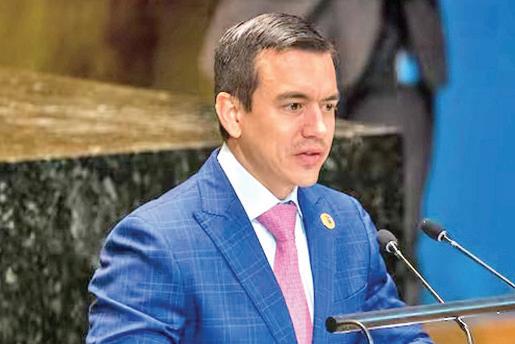
EPresident Daniel Noboa has decreed that Planning Minister Sariha Moya act as interim Vice President until Vice President Veronica Abad arrives in Turkey to represent the country there, the Minister of Government said on Thursday, the latest development in a long spat between Noboa and Abad.
The Labour Ministry
suspended Abad, who is also the nation's Ambassador to Israel, from her post in November, accusing her of committing a serious disciplinary offence by not complying with an order to travel to Turkey due to security concerns during the conflict in Gaza.
A court then overturned the suspension in December and the same day Noboa or-
dered Abad to go to Turkey to act as temporary counsellor at the country's embassy there.
Noboa has designated Moya, who he previously tapped as temporary Vice President, to once again act as interim until January 22 or when Abad arrives in Turkey, Minister of Government Jose De La Gasca said during a press conference.
Noboa and Abad, who were elected last year to finish their predecessors' terms, have repeatedly clashed. Abad has denied any wrongdoing.
Noboa is running for re-election in February and had been seen as unlikely to take unpaid campaign leave if it would mean Abad would briefly be in charge of Ecuador.
Gasca said on Thursday that Noboa was not obliged to take leave during the campaign. (Reuters)
The Government of Venezuelan President Nicolás Maduro has announced a US$100,000 reward for information on the whereabouts of exiled Opposition candidate Edmundo Gonzalez.
The announcement on Thursday comes eight days before Maduro is set to be sworn in for a third term, following a contested presidential election in July.
In the months since the vote, Maduro’s Government has issued an arrest warrant for Gonzalez, his rival in the race.
“A $100,000 reward is offered to anyone who provides information about his location,” the country’s Scientific, Criminal and Forensic Investigations Agency said in an Instagram post on Thursday.
The post framed a photo of Gonzalez in the style of a “wanted” poster.
Maduro’s Government has claimed the President prevailed in his re-election bid, but refused to release the usual breakdown of voter tallies that accompany elections.
The Opposition, meanwhile, accused Maduro of election fraud and said that Gonzalez was the rightful winner. It released what appeared to be election tally sheets showing Gonzalez beating Maduro by a two-toone margin.
Regional leaders have also cast doubt on Maduro’s claims of victory, asking that the Government release voter data that could validate the results.
The Government has yet to do so, and Gonzalez left the country for Spain in the wake of the September arrest warrant.
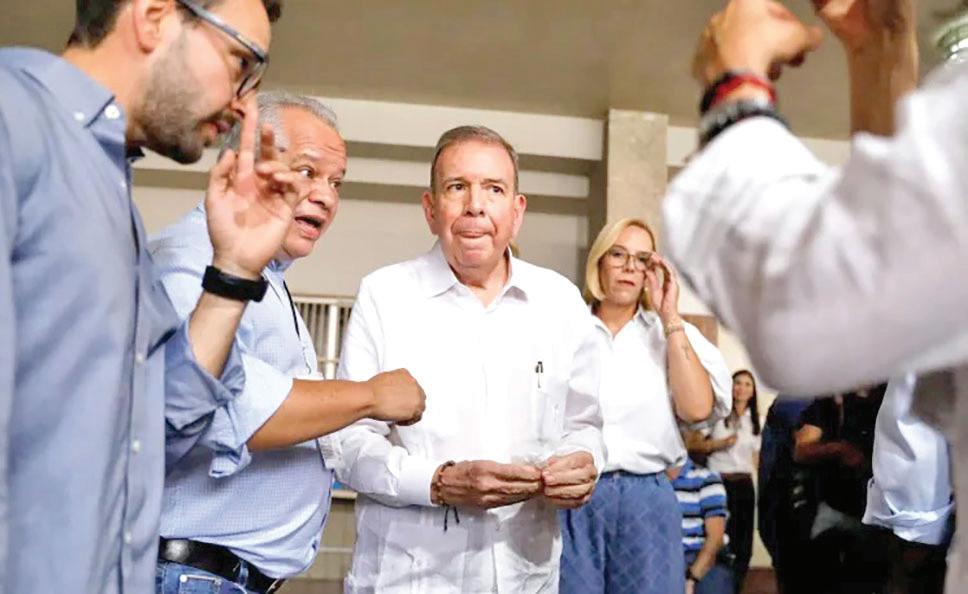
He had previously said he would return at the beginning of the new presidential term, and on Thursday, Argentina’s Government indicated he was en route to Buenos Aires.
Human rights groups and international organisations such as the United Nations have criticised the Maduro Government for repressive activities both before and since the contested election, including arbitrary arrests and torture. Nearly 2000 persons were arrested in the aftermath of the elections, and 23 were killed.
With Maduro’s third inauguration ceremony looming on January 10, a group of UN human rights experts appealed to Venezuelan authorities on Thursday to respect civil liberties, including the right to protest.
“We make a strong call to the authorities so that the rights to demonstrate and express oneself freely can be exercised without fear of possible reprisals,” the group’s president, Marta Valinas, said in a statement.
Maduro has become increasingly isolated following the contested election
and a harsh Police crackdown on Opposition-led protests. Even left-wing allies in Brazil and Colombia have pushed for his government to release transparent results.
The ongoing controversy over the election has also strained relations with Argentina, which has since severed diplomatic ties with Venezuela.
On Thursday, the government of far-right Argentinian President Javier Milei filed a complaint at the International Criminal Court (ICC) accusing the Venezuelan Government of the crime of “enforced disappearance” over the arrest of an Argentinian security services member in December.
The Argentinian Government states that Nahuel Gallo, a member of its gendarmerie, crossed into Venezuela to see family members.
Venezuelan prosecutors, however, say he is being investigated for possible links to groups seeking to carry out “terrorist” actions in the country. (Excerpt from Al Jazeera)





Oil prices settled up by more than US$1 a barrel on Thursday as investors returned for the first trading day of 2025 with an optimistic eye on China's economy and fuel demand after a pledge by President Xi Jinping to promote growth.
Swelling gasoline and distillate inventories in the US pressured prices and capped gains.
Brent crude futures settled at US$75.93 a barrel, up US$1.29, or 1.7 per cent. West Texas Intermediate (WTI) crude settled at US$73.13 a barrel, up US$1.41 or two per cent.
Xi said in his New Year's address on Tuesday that China would implement more proactive policies to promote growth in 2025.
China's factory activity grew more slowly than expected in December, a Caixin/S&P Global survey showed on Thursday, amid concerns about tariffs proposed by US President-elect Donald Trump. Some analysts view weaker Chinese data as positive for oil prices, because Beijing could be encouraged to accelerate stimulus.
An official survey released on Tuesday showed China's manufacturing activity barely grew in December. Services and construction fared better, with the data suggesting policy stimulus is trickling into some sectors.
US oil stocks data from the Energy Information Administration (EIA) released on Thursday, a day later than normal due to the New Year holiday, showed gasoline and distillate inventories jumped last week.
US gasoline stocks rose by 7.7 million barrels in the week to 231.4 million barrels. Distillate stockpiles, which include diesel and heating oil, increased by 6.4 million barrels in the week to 122.9 million barrels.
"The negative portion of the release was in the large product stock builds," said Jim Ritterbusch of Ritterbusch and Associates in Florida, which he said were attributable to an unexpected drop in demand.
Crude stockpiles fell less than expected, decreasing by 1.2 million barrels to 415.6 million barrels last week compared with analysts' expectations in a Reuters poll for a 2.8-millionbarrel draw.
Traders kicking off the new year also are probably weighing higher geopolitical risks and Trump's efforts to run the US economy hot against the expected drag from proposed tariffs, said IG market analyst Tony Sycamore.
"Tomorrow's US ISM manufacturing release will be key to crude oil's next move," Sycamore said.
Sycamore said WTI's weekly chart is winding itself into a tighter range, suggesting that a big move is coming.
"Rather than trying to predict in which way the break will occur, we would be inclined to wait for the break and then go with it," he added.
Oil prices are likely to be constrained near US$70 a barrel in 2025, down for a third year after a three per cent decline in 2024, with weak Chinese demand and rising global supplies offsetting the Organisation of Petroleum Exporting Countries (OPEC) and allies’ efforts to shore up the market, a Reuters poll showed.
In Europe, Russia halted gas pipeline exports through Ukraine on New Year's Day after the transit agreement expired on December 31. The European Union has arranged alternative supply ahead of the widely-expected stoppage while Hungary will keep receiving Russian gas via the TurkStream pipeline under the Black Sea. (Reuters)
Authorities sought on Friday to execute an unprecedented arrest warrant for impeached South Korean President Yoon Suk Yeol, evading a crowd of protesters that faced off with Police outside his residence and vowed to block any attempt.
Yoon is under criminal investigation for insurrection over his December 3 martial law attempt that stunned South Korea, Asia's fourth-largest economy and one of the region's most vibrant democracies.
An arrest would be the first for an incumbent South Korean President.
Officials from the Corruption Investigation Office for High-ranking Officials (CIO), which is leading a joint team of investiga-
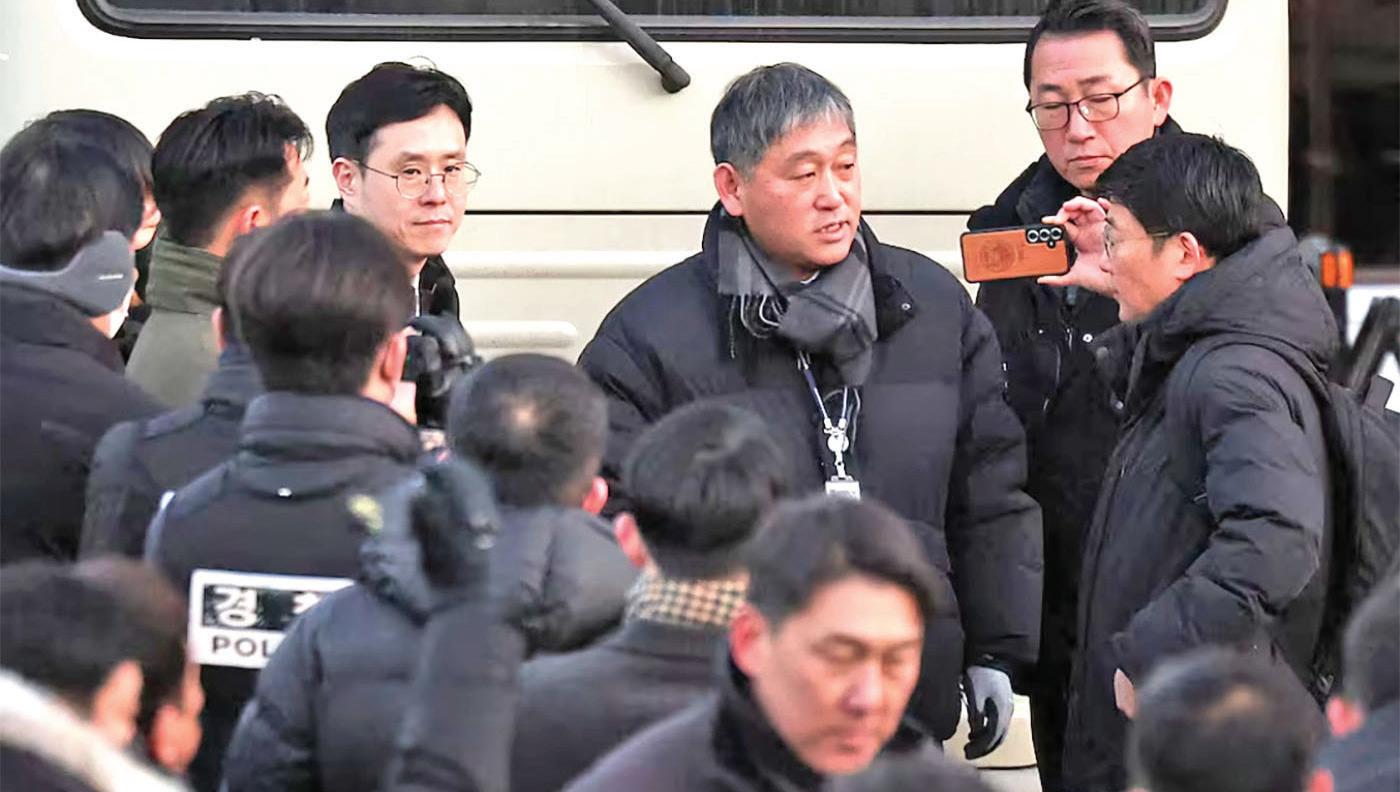
tors that include the police and prosecutors, had arrived at the gates of Yoon's compound shortly after 07:00h (2200 GMT Thursday), according to Reuters witnesses.
Media reports said the
CIO vehicles did not immediately enter the compound, partly due to a bus blocking the driveway, but live footage later appeared to show some CIO officials filing through an opened gate on foot.
It was unclear whether the Presidential Security Service, which has blocked access by investigators with a search warrant to Yoon's office and official residence, would try to stop the arrest.
Protesters gathered in the pre-dawn hours near the residence, with the numbers swelling into the hundreds amid media reports that investigating authorities would soon try to execute the arrest warrant that was approved on Tuesday after Yoon refused summons to appear.
"We have to block them with our lives," one was heard saying to others.
Some chanted "President Yoon Suk Yeol will be protected by the people," and called for the head of the CIO to be arrested. (Excerpt from Reuters)
AUS Army veteran who drove a truck into a crowd of New Year's Day revellers in New Orleans had pledged allegiance to Islamic State, but acted alone in the attack that killed at least 14 persons, the FBI said on Thursday.
The suspect, who the FBI said was shot dead at the scene after firing at police, has been identified as Shamsud-Din Jabbar, a 42-year-old Texan who once served in Afghanistan. He drove from Houston to New Orleans on December 31. On the morning of the attack, between 01:29h and
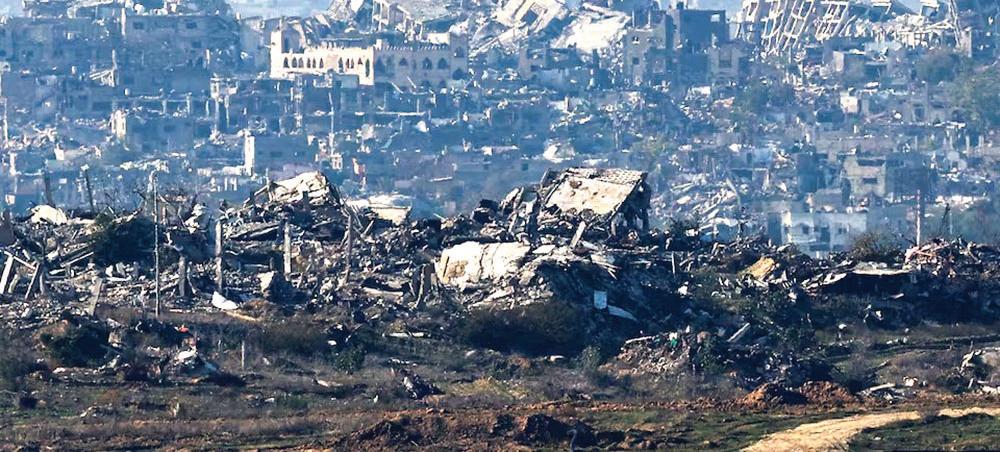
Israeli airstrikes killed at least 68 Palestinians across the Gaza Strip on Thursday, including at a tent camp where the head of the enclave's Hamas-controlled Police Force, his deputy and nine displaced persons died, Gaza authorities said.
Israel said the deputy was the head of Palestinian militant group Hamas' security forces in southern Gaza.
The attack occurred in the Al-Mawasi district, which was designated as a humanitarian zone for civilians earlier in the 14-month-old war between Israel and Hamas, which rules Gaza.
The Director General of Gaza's Police Department, Mahmoud Salah, and his aide, Hussam Shahwan, who were checking on residents of the camp, were killed in the strike, according to the Hamas-run Gaza Interior Ministry.
"By committing the crime of assassinating the Director General of Police in the Gaza Strip, the occupation is insisting on spreading chaos in the (enclave) and deepening the human suffering of citizens," it added in a statement.
The Israeli military said it had conducted an intelligence-based strike in AlMawasi, just west of the city of Khan Younis, and eliminated Shahwan, saying he led Hamas forces in south Gaza. It made no mention of Salah's death.
"As the year begins, we got ... another reminder that there is no humanitarian zone, let alone a safe zone" in Gaza, Philippe Lazzarini, Head of the United Nations agency for Palestinian refugees UNRWA, said in a post on X.
"Every day without a ceasefire will bring more tragedy." (Excerpt from Reuters)
03:02h., he posted five videos on Facebook in which he said he supported IS, the Islamic militant group with fighters in Iraq and Syria, the FBI said.
The massacre in New Orleans's famed Bourbon Street nightlife district during a holiday celebration has made for an unnerving start to the new year in the US, with law enforcement officials across the country promising heightened security for upcoming public events.
In his first video, Jabbar said he previously planned to harm his family and friends, but was concerned that the media coverage would not focus on the "war between the believers and the disbelievers", FBI Deputy Assistant Director Christopher Raia said at a press conference. Jabbar also said in the videos that he had joined IS before last summer and provided his last will and testament, Raia said. (Excerpt from Reuters)

Slovakia's Prime Minister, Robert Fico has threatened to cut financial support for more than 130,000 Ukrainian refugees as a dispute with Ukraine over Russian gas supplies escalates.
On January 1, Kyiv shut off a pipeline that for decades was used to supply Central Europe with Russian natural gas. Slovakia had been the main entry point and the country now stands to lose millions of euros in transit fees.
The United Nations' refugee agency (UNHCR) estimated last month that there were 130,530 Ukrainian refugees in Slovakia out of 6,813,900 globally.
Fico – who in December made a surprise visit to Moscow for talks with Russian President Vladimir Putin –
described Kyiv's move as "sabotage".
The Prime Minister of the EU state said he would propose halting electricity exports to Ukraine and also "sharply reducing" financial support for Ukrainians who have found shelter in Slovakia.
He said there was no risk of Slovakia itself suffering from gas shortages, as it had already made alternative arrangements.
But Fico added that Ukrainian President Volodymyr Zelenskiy's decision to turn off the taps would deprive Slovakia of 500 million euros ($518 million) in transit fees from other countries.
Last month Zelenskiy accused Fico of helping Putin to "fund the war and weaken Ukraine". (Excerpt from BBC News)










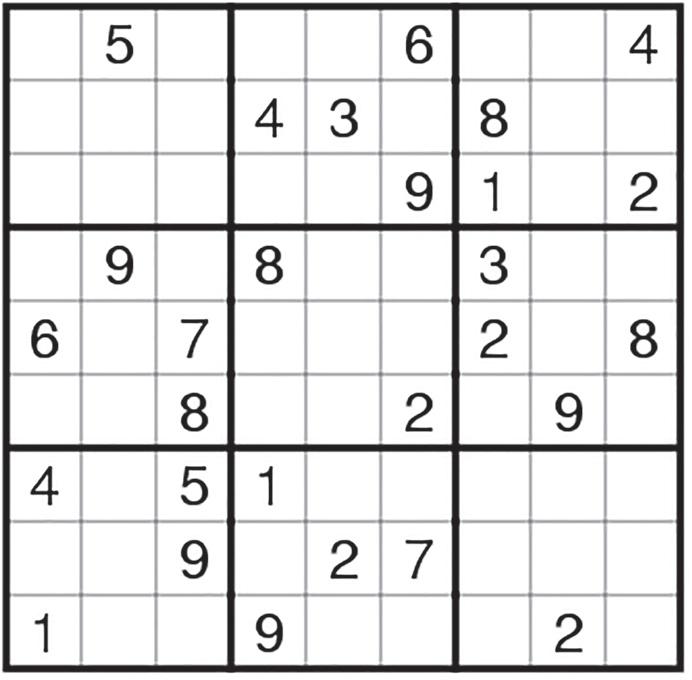





















Do your homework and put your plans in place. Participating in events that offer open discussions and alternatives will be inviting, but you should make sure that the agenda being offered aligns with your goals.
Procrastinating will weaken your position. Change is imminent, and the sooner you face facts and put your plans in motion, the sooner you will feel the relief of making a choice.
Think big, but when it comes to implementing your plans, execute the ones that are solid and within your budget. It's important to see situations clearly and act accordingly.
Trust your instincts, learn from experience and follow your heart. Head in a direction that motivates you to do something meaningful. Follow the road that helps you fulfill your dreams.
Before jumping on someone's bandwagon, take a closer look at the destination and consider if everything is up to your criteria. Put more trust in yourself and your own endeavors.
You'll be pulled in different directions regarding relationships, commitment and joint ventures. Attend events that offer alternatives and consider how to use all the information you gather to your advantage.
Address problems before they spin out of control. Say no to temptation, indulgence and excessive behavior. Stick close to home and take care of what's essential.
Scout for alternatives, participate in events or activities that intrigue you and pay attention to the people you love. Turn your day into something special.
Slow down, be observant and refuse to let anyone pressure you into making a premature decision. Put more time and effort into money management and implement a budget that helps fulfill your dreams.


Let your experience and charm lead the way, and you'll command attention wherever you go. Stand tall and speak with confidence, and positive change will unfold.



Share your feelings with loved ones, and you'll find a way to satiate your desires. Determine how to deal with concerns without jeopardizing your reputation or relationship.

Pay attention to presentation. Participate in events or activities that address your concerns, and you'll connect with someone who can help you achieve your objective.



Australia:



Trophy 2024/25; Test 5 of 5…

some
From that first day, when 17 wickets fell in Perth, there has been intrigue in this BorderGavaskar Trophy. Even the game that was ruined by rain in Brisbane had thrown up something unexpected - a sudden retirement. Now, as a hard fought and highly entertaining series comes to an end, Australia have the chance to cement their legacy: the reigning ODI and Test world champions have one hand on a trophy that has eluded them for 10 years, but India still have the chance to deny them that trophy.
There have been reports of friction inside the India ranks. Captain Rohit Sharma is so short of runs that his place in the team isn't looking so good. Coach Gautam Gambhir did not confirm whether the captain would be in the XI, and that has created a very different feel to India's buildup. Shubman Gill, who was left out at the MCG Test, was one of the first in the nets; and Dhruv Jurel, who hasn't played since Perth, was the last to leave. If that's any indication of a change in India's batting lineup, is Rohit going out?
India have been struggling to score first innings’ runs. Their average of 22.40 is the seventh lowest in
a season in which they've played at least five Tests; and they’ve had to play catch-up constantly in Australia. Sydney is a place they might enjoy though. The SCG isn't quite the batting paradise it used to be, like when India declared on 705 here in 2003, but it is still offering 34.85 per wicket, which is better than any other ground in Australia over the last three years.
That could be one of the reasons Australia are bringing in bowling reinforcements. The short turnaround between the Boxing Day and the New Year's Tests is another.
Beau Webster would be making his Test debut in place of Mitchell Marsh.
For a while, it had looked like India might be able to escape the MCG with a draw. Yashasvi Jaiswal has again proved to be India's best batter. At the end of that game, Rohit said the juniors still had a bit to learn about Test cricket, but it seems like they're doing alright.
Jaiswal is India's highest scorer

of the series. Nitish Kumar Reddy produced their best moment. Akash Deep has won Steven Smith's admiration, but he's out of the Sydney Test with a bad back. India's vulnerabilities lie elsewhere.
In the spotlight: Rohit Sharma and Pat Cummins Will Sydney be the last of Rohit Sharma in Test cricket, or is he already done?
India's win in Perth came without Rohit Sharma. He tried not to upset their momentum by moving himself down to the middle order, but then felt that wasn't working well enough. With not enough runs behind him; his on-field decisions backfiring; and India's next Test not until June 2025, by which time he would be 38, it feels like the end of something.
offspin, will be the third debutant for Australia in this series, after Nathan McSweeney and Sam Konstas. He was the highest scorer in the Sheffield Shield last season with 938 runs at 58.62, and he took 30 wickets at 29.30.
Australia: 1 Usman Khawaja, 2 Sam Konstas, 3 Marnus Labuschagne, 4 Steven Smith, 5 Travis Head, 6 Beau Webster, 7 Alex Carey (wk), 8 Pat Cummins (capt), 9 Mitchell Starc, 10 Scott Boland, 11 Nathan Lyon. With Akash ruled out with a stiff back, India would have to rejig their bowling attack, with either Prasidh Krishna or Harshit Rana set to replace him. There appear to be changes in the batting line-up as well, with Gill receiving direct attention from Gambhir, who gave him throwdowns.
India (probable): 1 Rohit Sharma (capt)/Shubman Gill, 2 Yashasvi Jaiswal, 3 KL Rahul, 4 Virat Kohli, 5 Rishabh Pant, 6 Ravindra Jadeja, 7 Dhruv Jurel, 8 Nitish Kumar Reddy, 9 Prasidh Krishna/ Harshit Rana, 10 Jasprit Bumrah, 11 Mohammed Siraj.
Pitch and conditions:
A good cricket wicket
A day out from the Test match, there was a bit of grass on the SCG pitch. The feedback Cummins has received about it from the two Shield games that took place here this season is that it's been a "good cricket wicket", with enough in it for the bowlers, particularly that there's a bit more pace in it.
Beau Webster is set to make his Test debut at the SCG
He did bat in the nets on Thursday, facing only throwdowns, which is what he did ahead of the Melbourne Test as well. If this series didn't have Jasprit Bumrah in it, Pat Cummins would be its best bowler. After a wayward start in Perth, he looked pumped in Adelaide, keeping the rich tradition of fast bowlers and their nervepopping celebrations alive. He was Player of the Match in Melbourne for contributing with the bat as well. A win at his home ground in front of what is expected to be record crowds again, to seal a place in the World Test Championship final, would be the perfect way to end the season for Cummins.
Team news: Webster in, Akash out Mitchell Starc will play in Sydney while managing a side/rib complaint. Webster, who bats right-handed and bowls both medium pace and

Jurel also seems like a chance to make the XI, with Washington Sundar possibly sitting out.
The weather for the start of the Test is expected to be clear, although there is some rain forecast on the final two days.

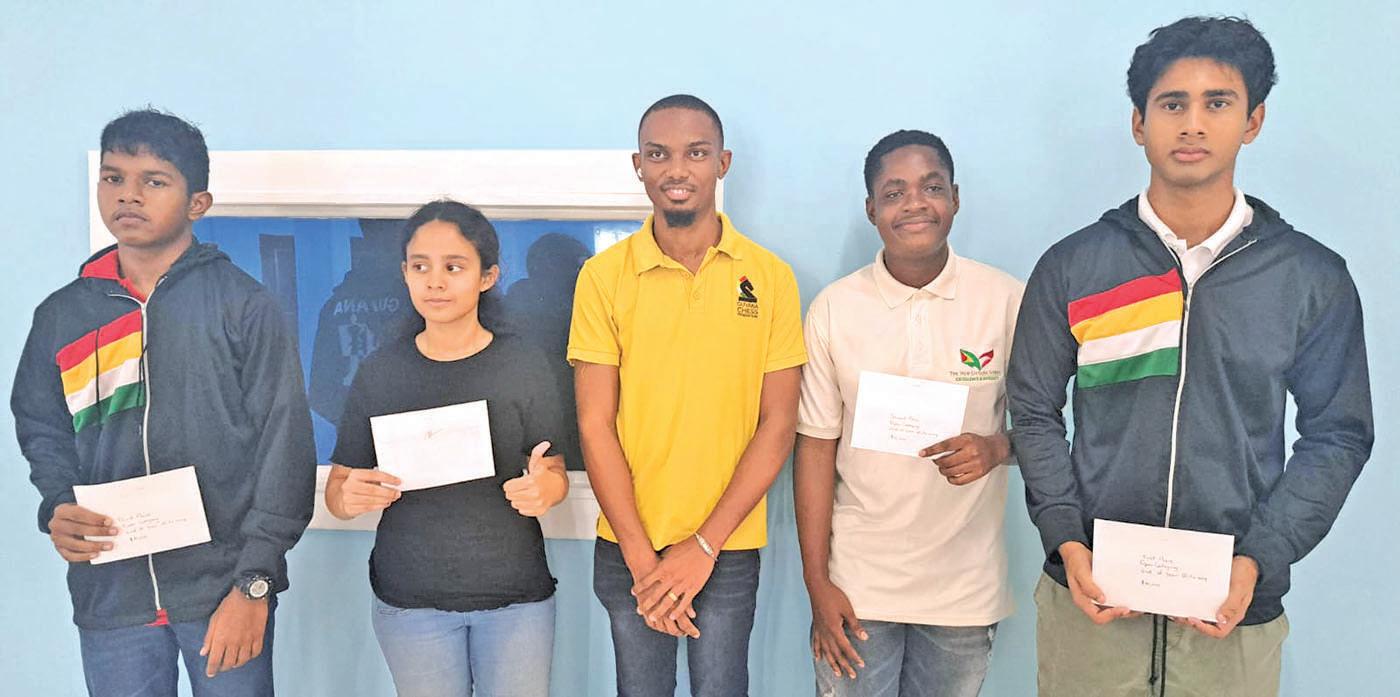
It was no surprise to the chess community when three young men:
Candidate Master Sachin Pitamber, Kyle Couchman and Keron Sandiford, emerged as the top three winners of the End of Year Rapid and Blitz Chess Competitions held at the David Rose Special School last weekend.
Young Pitamber, who gained his Candidate Master Title in September last and played unbeaten, emerged as the winner in the End of Year Rapid Tournament with 8.5 points in the nine-round Swiss competition.
Couchman came in a close second with 8 points, while Sandiford, known for his talent in fast-paced competitions, placed third with 6.5 points.
Couchman won the End of Year Blitz Tournament
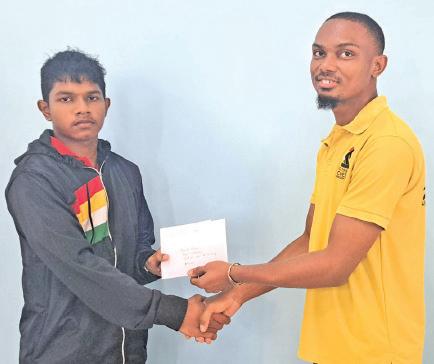
with 8 points, while Sandiford came in second with 8 points, and Pitamber placed third with 6 points.
Junior Champion Ricardo Narine, playing in
the U20 Category, emerged victorious over his counterparts with 8 points. Young Nicholas Zhang and Woman Candidate Master (WCM) Aditi Joshi, each with 6.5

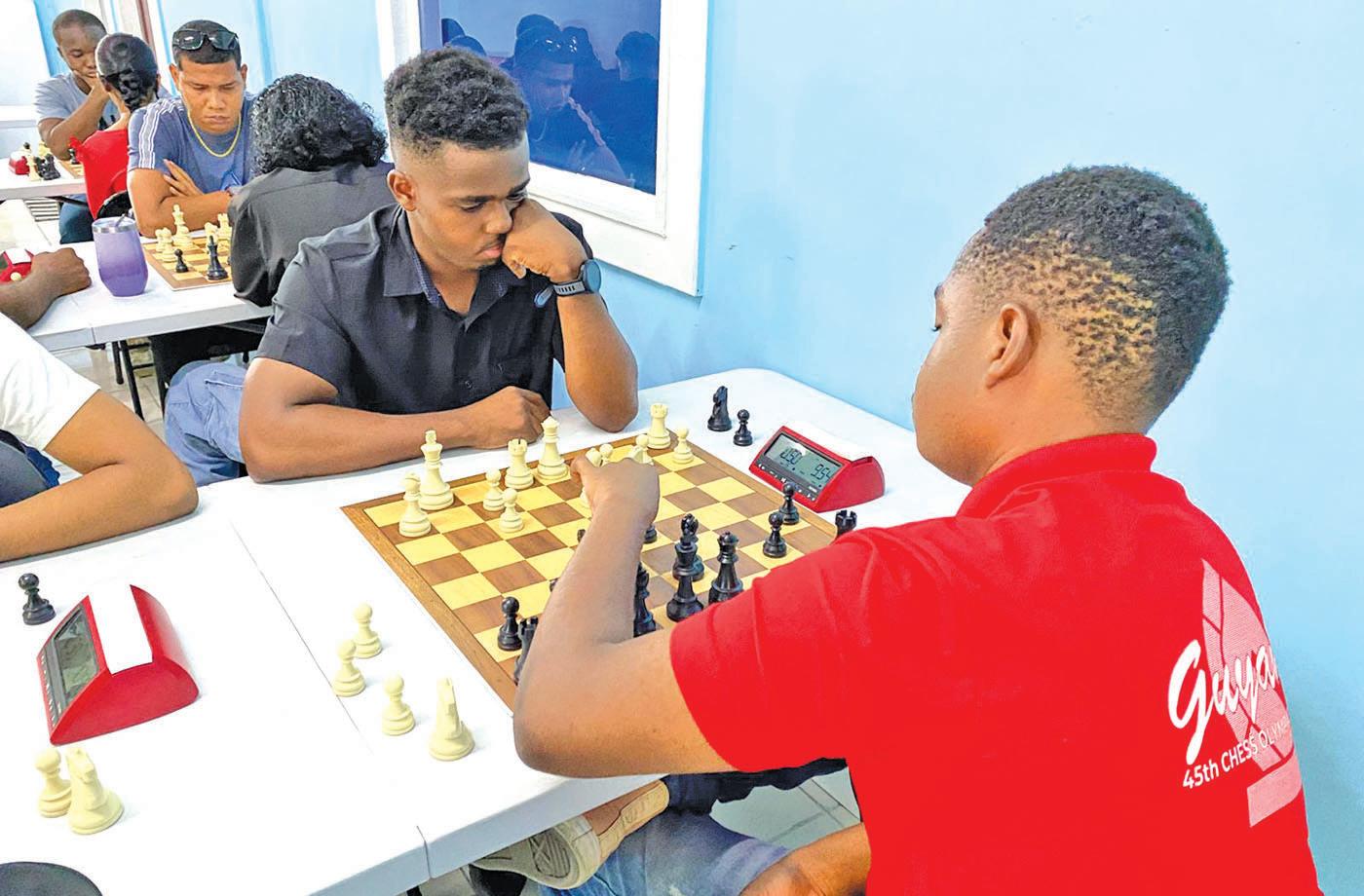
points, placed second and third respectively.
The prizes for Best Female players in the Rapid competition went to WCM Jessica Callender and Tharisha Montes De Oca in the Open and U20 categories respectively, while Joshi copped the Best Female prize in the Blitz competition.
Notable performances in the Rapid competition were recorded by Kishan Puran with 6 points and newcomer Aravinda Singh with 5 points playing in the Open Category; Alexander Zhang with 6.5 points and newcomer Krishna Singh with 5 points playing in the U20 Category; and Rolex Alexander and Nicholas Zhang each with
5.5 points playing in the Blitz competition.
Sponsored by the Guyana Chess Federation (GCF), the tourneys attracted almost thirty players vying for $225,000 in cash prizes. The End of Year Rapid and Blitz tourneys were set to complete the 2024 calendar of chess tournaments hosted by the GCF. The Rapid chess competition was played on Saturday, December 28th, in two divisions: the Open and U20 categories, with a time control of 15 minutes plus 5 seconds added to the clock after each move. The Blitz competition played on December 29th had a time control of 5 minutes plus 5-second increments.
The GCF wishes to thank the players for their resolute commitment to chess and their participation in the tourneys, which culminated in the chess events for 2024. Gratitude is also extended to arbiter of the tournaments, FIDE Master Anthony Drayton. In addition, the GCF wishes to thank David Rose Special School for providing the venue for the tournament.
Moreover, GCF is extending its best wishes for 2025 to “all our sponsors, supporters and friends in the chess community. Join us on guyanachess.gy, Facebook, and Instagram to keep updated with chess activities.”

The Cougars Under-20 team have created the first upset in the Candy Boss 8-a-side Football Tournament by beating Cougars’ Seniors in their semifinal match-up on Wednesday night. In so doing, they have booked a place in the finals of this tourna-
ment, which is to be played on Saturday evening at the All-Saints Ground in New Amsterdam.
Being initially touted as a “friendly encounter between the two sides”, with the senior team even considering it “a warm-up match”, the result has been even
more astonishing. The U20 boys had a different perspective on the game, and in the fourth minute of play, Quincy Mickle found the back of the net to send the small crowd into a frenzy. Two minutes later, Marlon Bissmolle secured an equaliser “to keep the young-
er boys in check”. However, in the 16th minute, Gary Ennis made clear the young er boys’ intentions by put ting them back in the lead, and Shaquille Semple’s 26th minute goal brought panic in the seniors’ camp with the score reading 3-1.

Alex Fordyce scored just before the half-time whistle to leave the scoreline 3-2 in favour of the underdogs; and one minute into the second half, Referee Colin Bowry blew his whistle for an infringement and pointed to the penalty spot. The shot was taken by Tyrice Ogleton, and it brought up the equaliser. However, two minutes later, Referee Bowry again blew his whistle for an infringement, and pointed to the penalty spot. This time, Alistair Drakes unerringly put the U20 boys back in the lead, with the scoreline reading 4-3.
Desperate for another equaliser, the seniors’ goalie found himself playing way out of the 18-yard box, and John Reid seized the opportunity to make it 5-3 in favour of the U20 boys. The tournament was expected to continue on Thursday evening with Police FC meeting Monedderlust in their semifinal match-up. The winner will play Cougars U-20 in Saturday’s final. (G4)


‘One Guyana’ National Futsal Championships…
Atotal of 64 teams drawn from around the country has now boiled down to the final two, after the semifinals in the Kashif and Shanghai ‘One Guyana’ National Futsal Championships were staged on New Year’s Night.
Renowned rivals Sparta Boss and Bent Street have ensured they would lock horns on Friday by each winning their respective semifinal games.
In addition, the second leg of the Women’s division semifinal was also contested, leaving Lady Canaimas and Lady Royals to battle in Friday night’s final.
The action on Homestretch Avenue began with the Lady Canaimas pummelling The Lioness 7-0. This time around, Glendy Lewis led the way for Canaimas, finding the back of the net twice in the third minute, then once each in the 14th and 17th minutes for a helmet trick. Glendy Lewis

of the game worked in favour of Sparta Boss, as accumulated fouls presented them with a scoring opportunity, which Junor again converted to level the scores.
There were near misses on both ends, as Simeon Moore and Marks could only connect with the crossbar, while the likes of Curtez Kellman and Omari Glasgow missed opportunities to finish their chances in front of the net.
Sparta Boss captain Jermin Junor, however, completed his hattrick with a game-winning goal in the 38th minute, thereby leading his team to the 3-2 win.
After game, Sparta’s Curtez Kellman spoke of their rivalry with Back Circle, and of their intent to turn the tables on their rivals.

in their last two outings in separate tournaments, the fans at the Sports Hall were plunged into a frenzy when
“It was a very good game, good intensity. We know Back Circle is a team that pipped us in the last two finals, so there’s no way you can come and beat Sparta Boss three times consecutively in this format of the game. We had our plan, we had our strategy, and we came out and execute,” Kellman related about history and rivalry in Wednesday night’s game.
He added, “I

The final game of the night trickled over into the wee hours of Thursday morning as a goal-fest ended 8-6 in Bent Street’s favour over Road Road Warriors brought the challenge to the experienced campaigners, as Dionathas Pereira opened the scoring in the 3rd minute. Bent Street’s Daniel Wilson replied in the 6th, but Road Warriors again seized the lead through Matheus DeSouza in the 10th. Wilson netted his second in the 20th to level the scores 2-2 at the half.
In the second segment, Bent Street looked more comfortable as Colin Nelson went on to break the lock in the 22nd. Adrian Aaron and Daniel Ross followed with respective goals in the 28th and 29th to put Bent Street 3 goals ahead. However, Road Warriors went on a spree as Matheus DeSouza and Hildemir Filho both found the back of the net in the 32nd, while De Souza completed his brace in the 36th and Wendrecky De Souza netted in the 37th.
By that time, Jamaine Beckles had his first in the 36th to level the scores at 6-all.
Both finals and thirdplace playoffs are set to be contested at the same venue today, Friday January 3.
As one would expect, each side playing for a grand prize has high hopes and expectations for their teams.
Lady Canaimas’ Glendy Lewis said about tonight’s final, “I think we’ll come out victorious because we team is always the strongest. So, I hope that we will become the champions again.
“They are good players, so I know they will be coming and play hard against us; but, you know, we’re ready always,” a confident Lewis has expressed.
Also oozing confidence, Lady Royals’ Shontell Greene has been was very appreciative of the opportunity to compete.
“Well, for Friday night’s final, I’m expecting a win because it’s the sport that we love playing, football. We work hard and we going out there and get the win, cause it’s going to inspire the rest of females to come out and play. And thanks to Kashif and Shanghai, cause we look forward to more female football to encourage female to come out and play,” Greene has said.

Kellman told this publication, “The plan would never change, the plan remains the same. Everyone who watch this format of football know that Sparta Boss stick to one brand, and that’s the brand that we have been using and becoming successful throughout the years, and we will continue using that band of football so that we could come out victorious.”


struck in the 9th, while Sandra Johnson netted a brace in the 15th and 16th minutes for the win.
Having won both their games convincingly, Canaimas’ Glendy Lewis believes they’re off to the right start.
“I think the tournament is
Jermin Junor netted first for Sparta in the 9th minute.
However, Bevney Marks and Darren Benjamin ensured Back Circle of a half-time lead by netting in the 15th and 18th minutes respectively; thereby quieting their doubters for a brief moment.
In the second half, the rules
think the team came into this game with a very good mindset, very optimistic. We knew (that) once we stick to our plan, we would come out victorious. During the past few training sessions, we worked hard, had a few strategies that we need to come out and execute, and we did just so.”
The fans of the Sports Hall broke out into euphoric cheers, some even making their way onto the court, when Daniel Ross broke the tie in the 40th minute. Seconds later, Beckles also scored to seal the win for Bent Street.
Adrian Aaron, captain of Bent Street, in discussing their game plan and their drive to quiet the naysayers, told this publication exclusively, “Well, we come in this game with one plan, we stick to the plan, and we get the win.
“I know a lot of fans doubting us tonight, and we show them why we are Bent Street and why we are competing in this tournament.
Like I said, the game plan. We stick to the game plan and we know we going to get over the line.
She went on to state, “To

“This team only plays based on 5 players, and we know (that) with 40 minutes on the clock, they can’t beat the players that we have. We have a good, experienced team, and we been around about 4 years. We know one another good, and that’s how we execute our plan and get the victory,” the Bent Street Captain further stated.
me, it’s not a competition. For me, with my team, not a competition; because we know how the players does play already, and we going out with vengeance to get this win. First place!”
For the Men’s finalists, a plan seems to be key to their performances tonight.
Sparta Boss’s Curtez
On the other hand, Bent Street’s Adrian Aaron opined, “For the past 2 years or 3 years, it’s we and Sparta in every Kashif tournament. Check. I think this is the fourth time, and all four times we in the final. I think it’s 2 to one now. I think we got to come hard with a plan, and we’ll The Women’s finalists are competing for a $200,000 grand prize, while second and third place will settle for $100,00 and $60,000 respectively.


In the Men’s competition, a $2M first prize is up for grabs; with second, third and fourth place receiving $1M, $500,000 and $200,000 respectively. Both MVPs in each competition would ride off with a brandnew motorcycle. The Futsal action will get underway at 20:00hrs.





